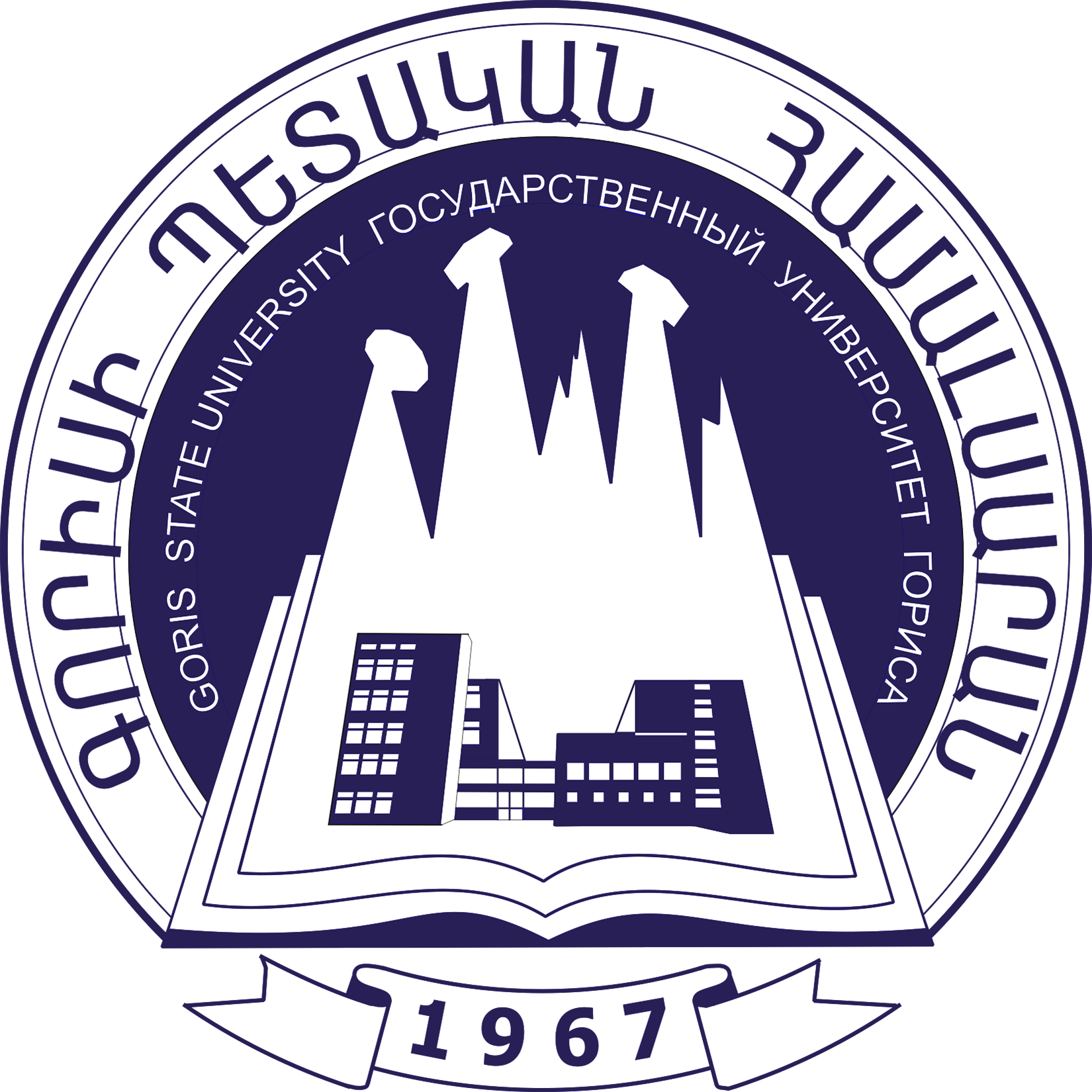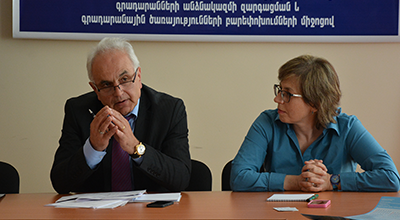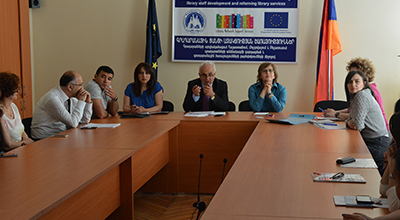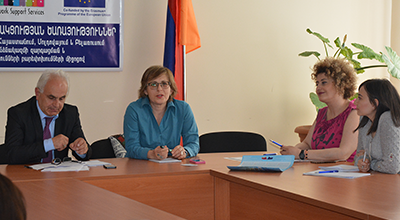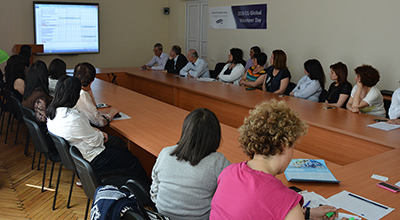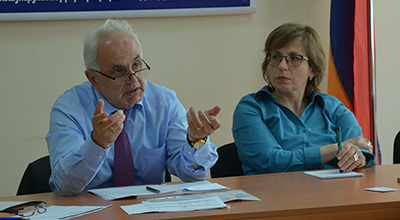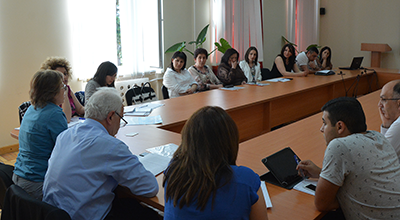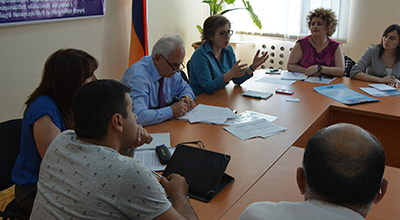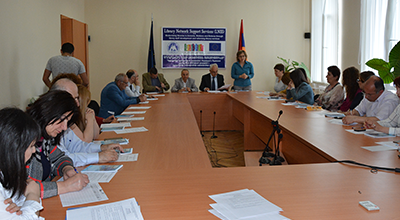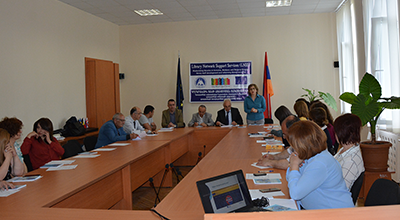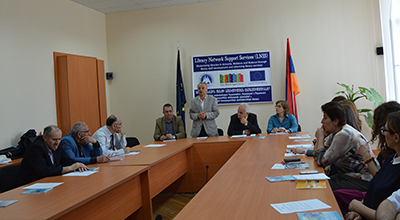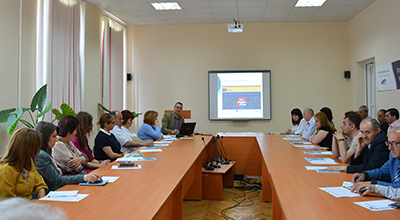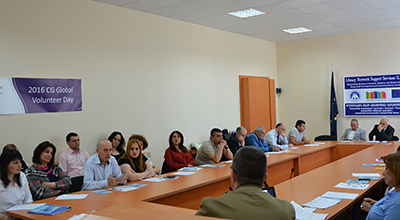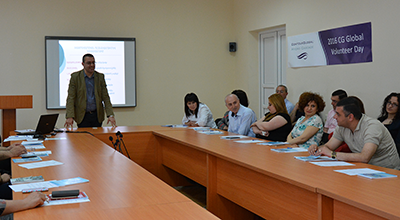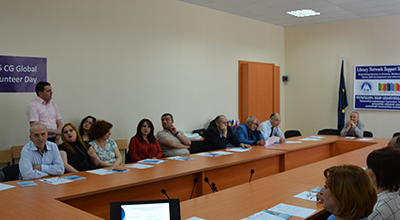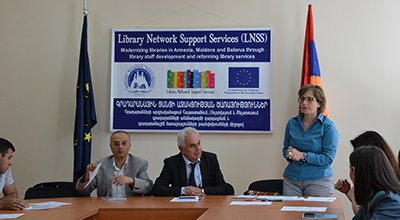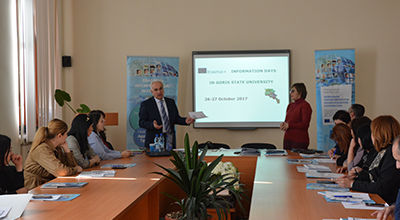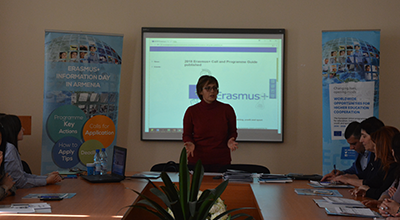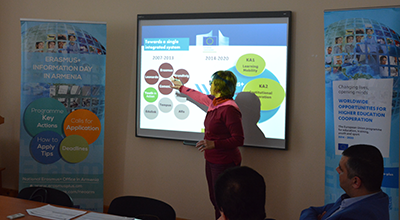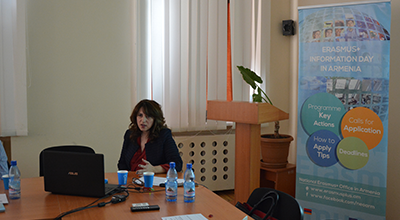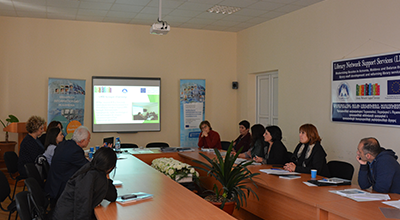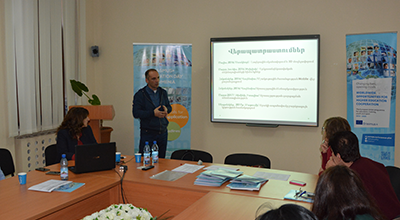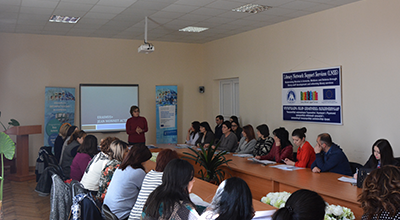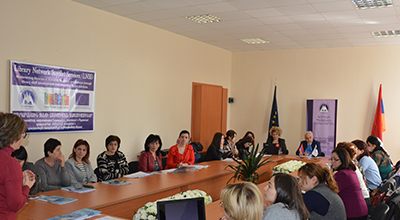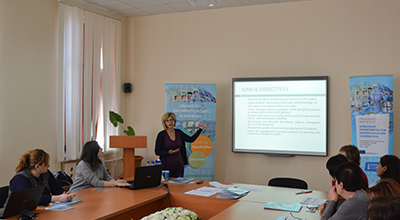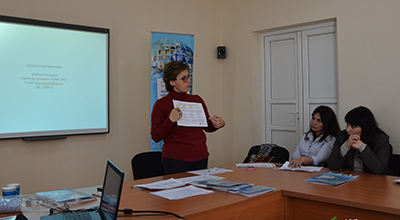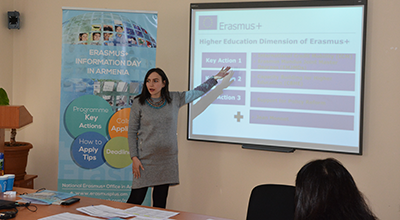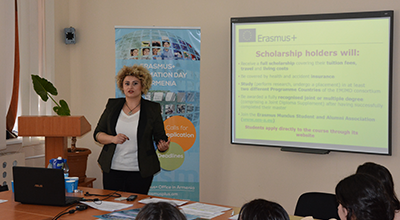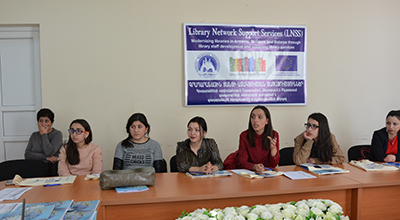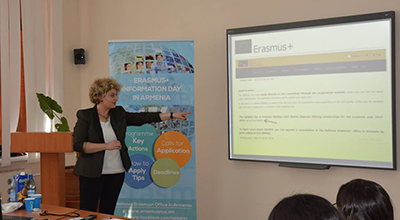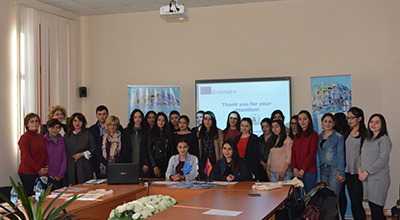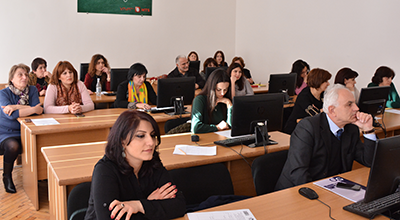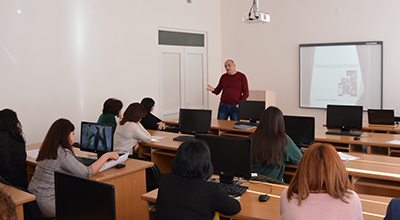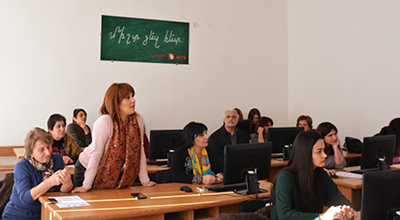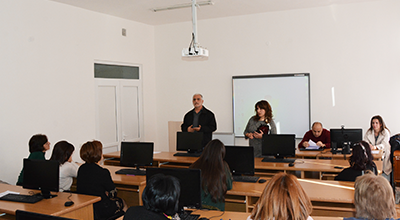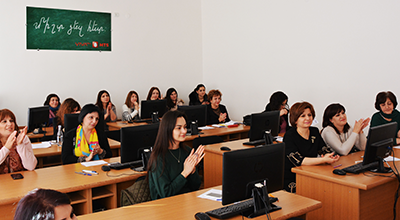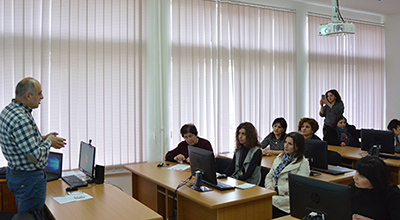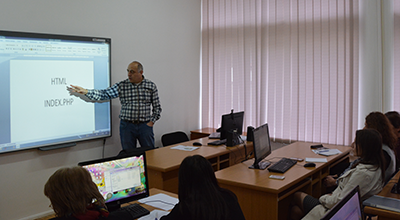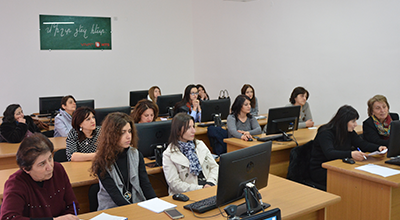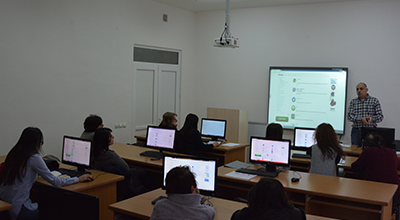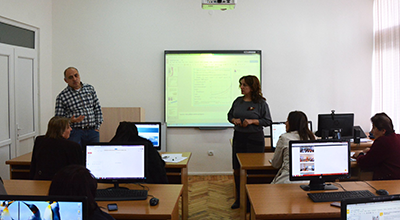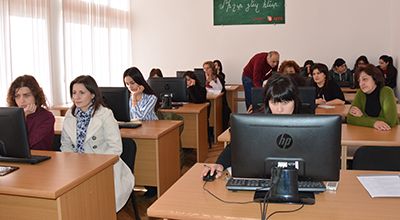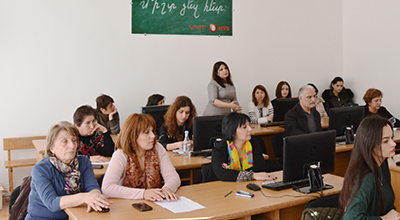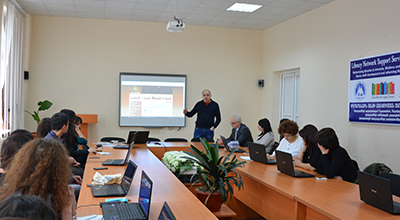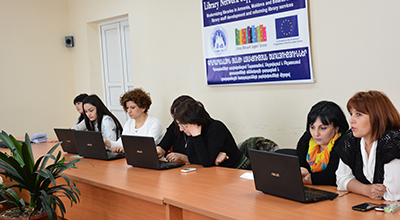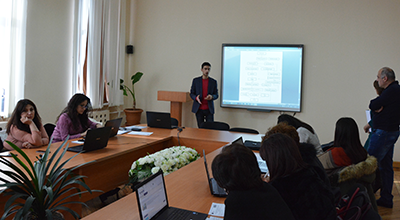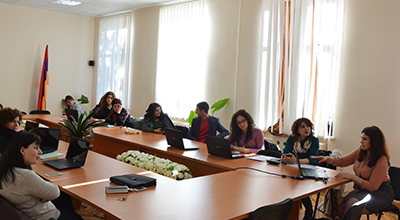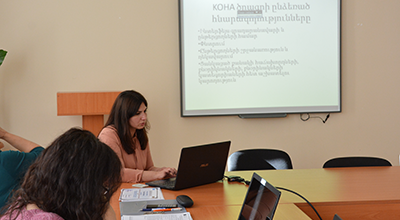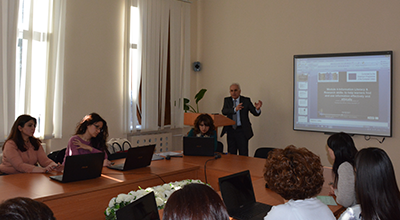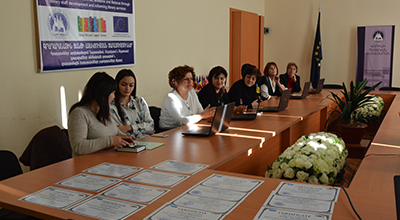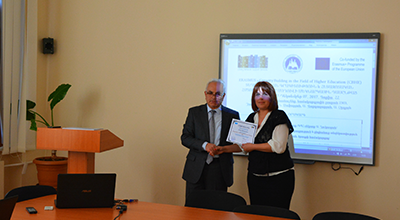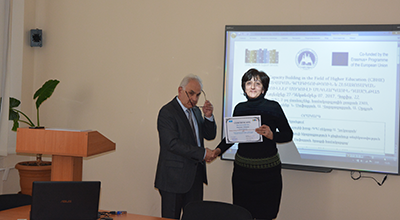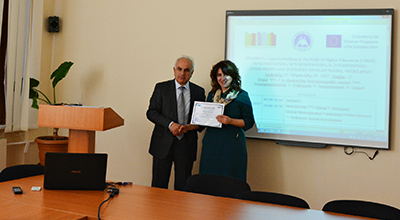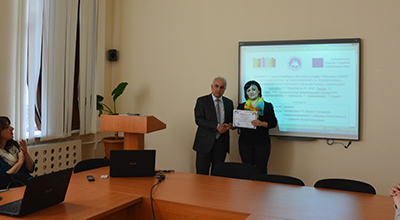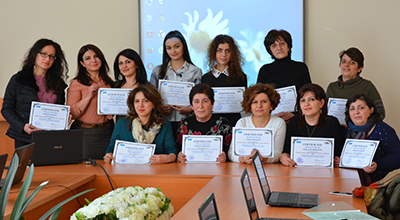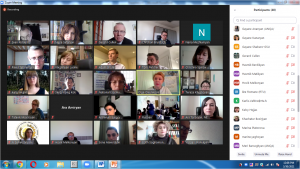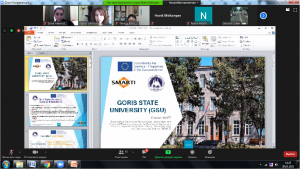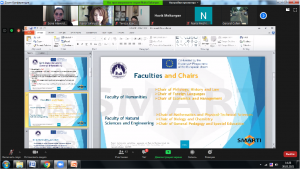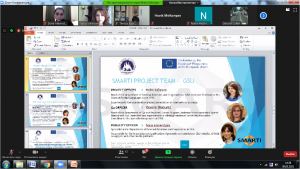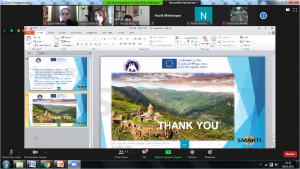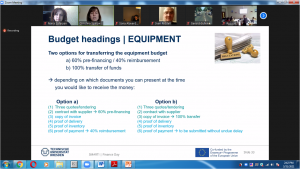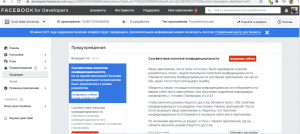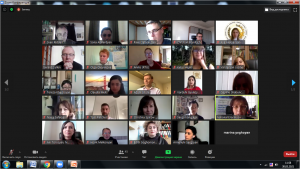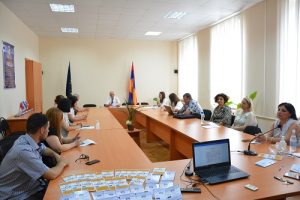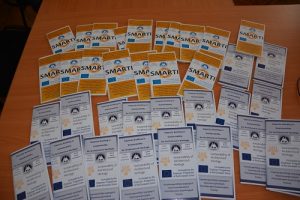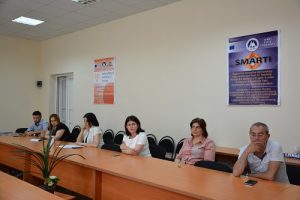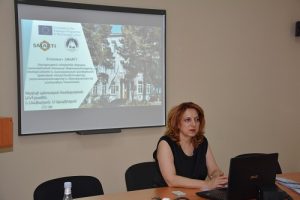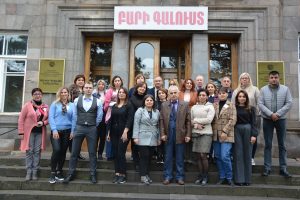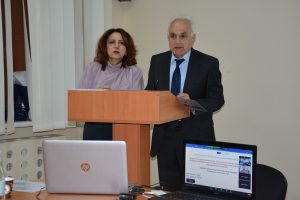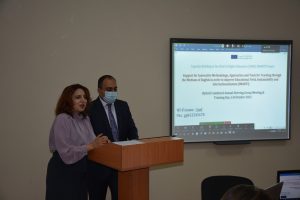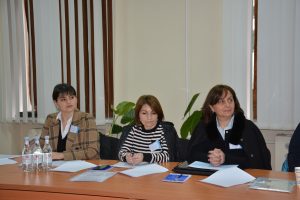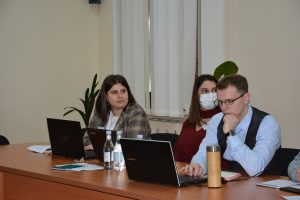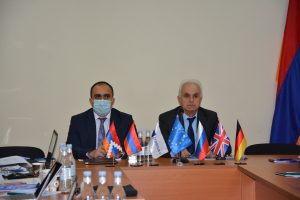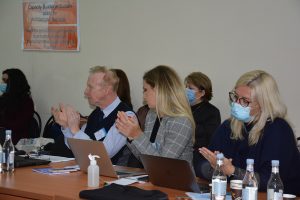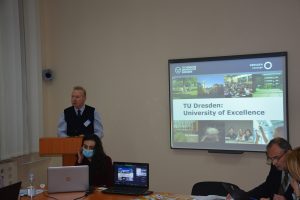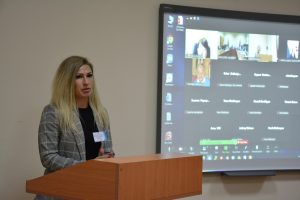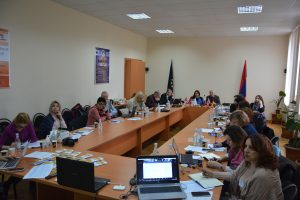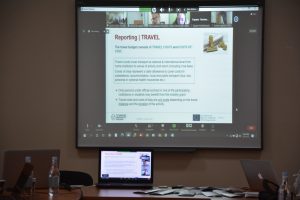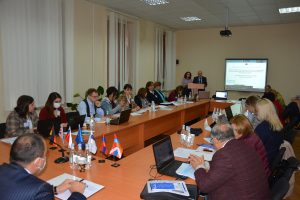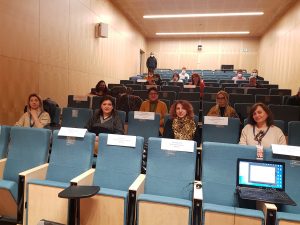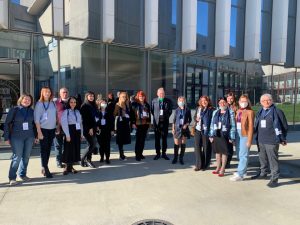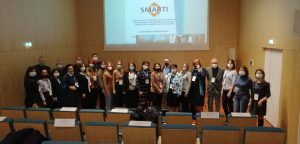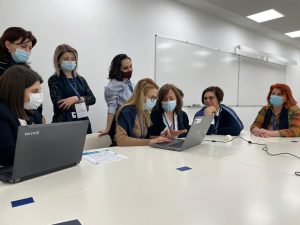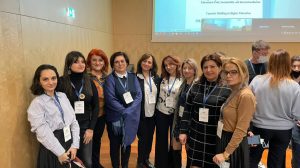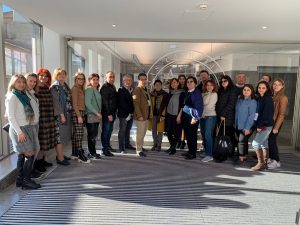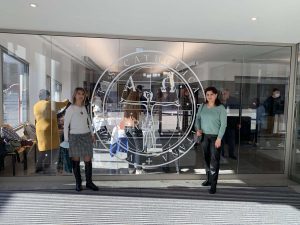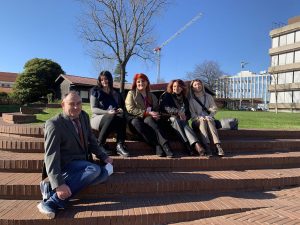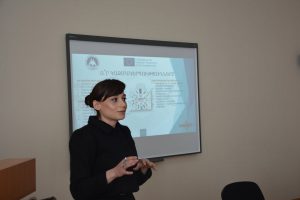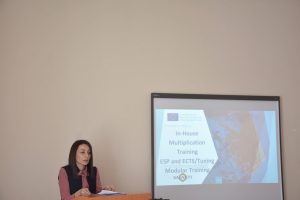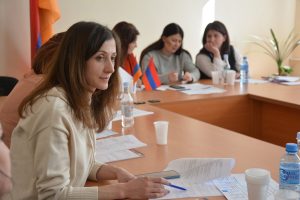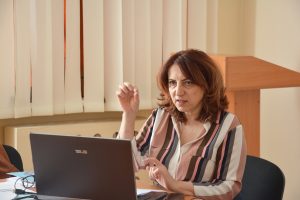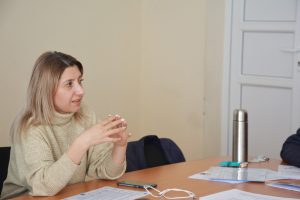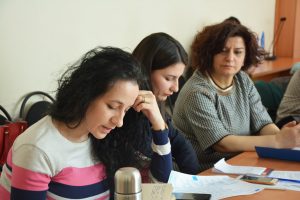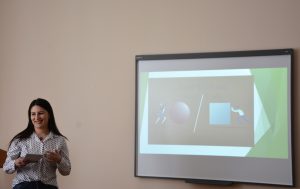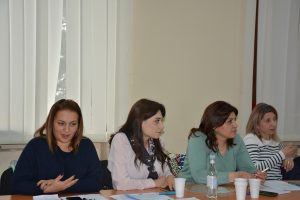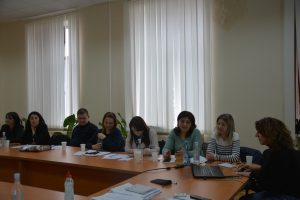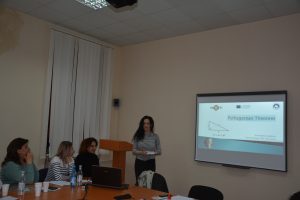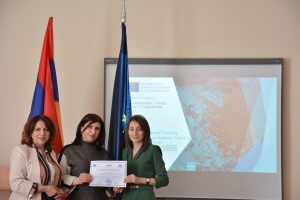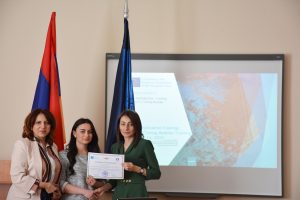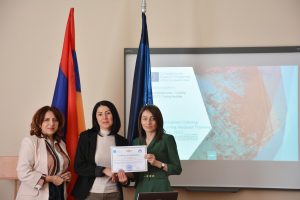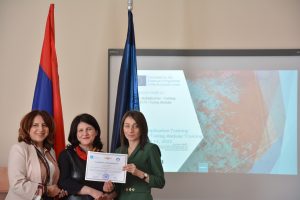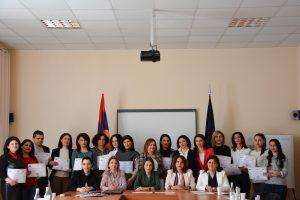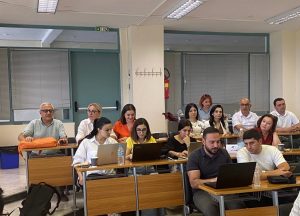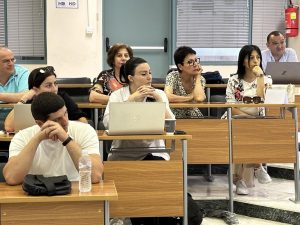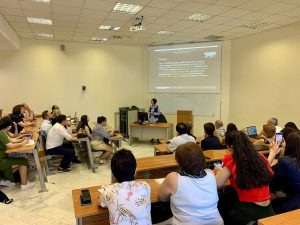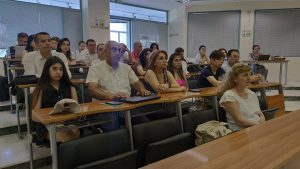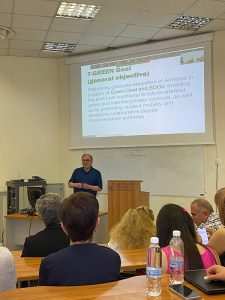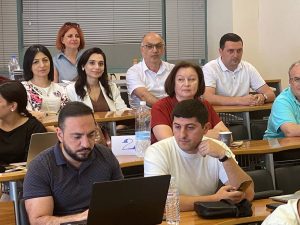
GENERAL INFORMATION ABOUT MAHATMA PROJECT
MAHATMA(Master In Higher Education Management: Developing Leaders For Managing Educational Transformation)
Tempus+MAHATMA project is a three-year grant funded project which was presented during Tempus IV Call for Proposals 5. The project was launched on the 15th of October 2012 and ended on the 14th of October 2015.
Armenian State Pedagogical University after Kh. Abovyan, coordinated all the activities within the project: this fact is unprecedented in the history of Armenian universities.
The project aimed to promote the transformation of higher education management in Armenia and Georgia through introduction of a new Master’s Academic Programme/professional development courses in higher education management in compliance with the European standards and principles.
During the project implementation modules for trainings of educational leaders were developed and several cognitive visits were paid to European universities. As a result, the representatives of the academic and administrative staff of the project partner universities were trained at the EU universities and other international organizations.
Necessary educational requirements, outcomes, an assessment system in compliance with qualifications, a new teaching and learning methodology were developed. The capacities and skills of the academic and administrative staffs of the partner universities were improved.
The project also aimed at the introduction and implementation of a new Master Academic Programme in “Education Management”, the professional orientation, involvement of new students in the programme, an introductory consultation for students, students’ exchange programs, as well as the expansion of student’ s employability.
In the framework of the project eight Master Academic Programs were developed and launched at the partner educational institutions in Armenia and Georgia with the support of six European partner organizations.
PROJECT PARTNER INSTITUTIONS AND ORGANIZATIONS
Universitat Koblenz-Landau (Germany)
Masarykovauniverzita (Czech Republic)
Centre International d’EtudesPedagogiques de Sevres (France)
Bath Spa University and Middlesex University (United Kingdom)
Educational Center of European Initiatives(Italy)
Armenian State Pedagogical University named after Kh. Abovyan, (Armenia)
Armenian State University of Economics, (Armenia)
Vanadzor State University of after H. Tumanyan, (Armenia)
Goris State University, (Armenia)
National Center of Professional Education Quality Assurance (Armenia)
Ministry of Education and Science of the Republic of Armenia (Armenia)
Ilia State University (Georgia)
International Black Sea University (Georgia)
ShotaRustaveli State University (Georgia)
AkakiTsereteli State University (Georgia)
National Center for Education Quality Enhancement(Georgia)
Ministry of Education and Science in Georgia (Georgia)
MASTER ACADEMIC PROGRAMME OF EDUCATION MANAGEMENT
The programme aims to improve the management of Armenian higher education institutions, thus ensuring the effective organization of the educational process, by proposing objectives to meet the current educational as well as the qualitative and professional needs and requirements of the labor market. The programme is considered to be a professional challenge for the governing bodies of the educational institutions and other employees who occupy managerial posts in the wider sectors of education.
The goal of the Master Academic Programme is:
- to provide basic professional knowledge, capacities and skills in the field of education management
- to implement research and experimental works
- to show a creative approach
- to be fast and timely oriented and react to the modern requirements of education as well as the decision making process.
PREREQUISITES AND NECESSARY DOCUMENTS FOR ADMISSION
- Bachelor’s Degree or Diploma Specialist
- Provision of Professional Qualification Standards requested by the HEI
- Knowledge of English(desirable)
- CV
- Motivation letter representing the applicant’s goals and interests
NAME OF THE COURSE- EDUCATION MANAGEMENT
- Qualification- Master of Education Management
- Course Language – Armenian and English
- Type of the course- Full-time
- The license-awarded by the Ministry of Education and Science of the Republic of Armenia.
AREAS OF PROFESSIONAL ACTIVITIES
The graduates of the academic programme acquire knowledge and skills in the field of management, administration and pedagogy, which provides the opportunity of getting managerial positions in higher education, secondary vocational and general education institutions as well as other areas of professional activities.
- Public and private educational institutions
- Companies providing educational services
- Academic associations (consortiums)
- Education-related state, local authority and community bodies.
The graduates of the academic programme can be employed as:
- education managers or organizers
- managers/organizers of institutions developing and organizing education policy in the state management and local authority bodies
- HR managers in the educational institutions
- specialists of the education quality assurance system
The Master Academic Programme “Education Management ” provides opportunities for the graduates to continue their studies in postgraduate professional programmes.
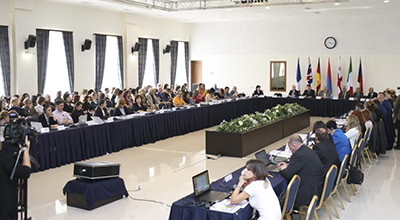
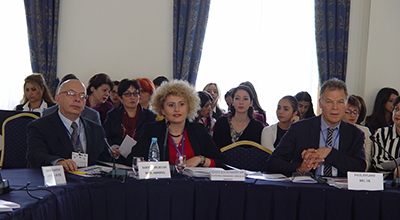
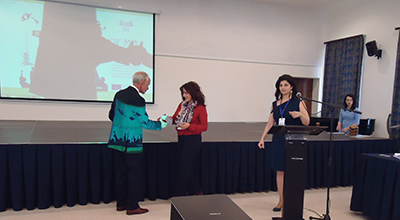
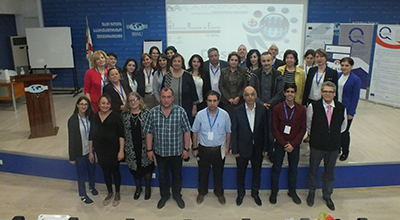
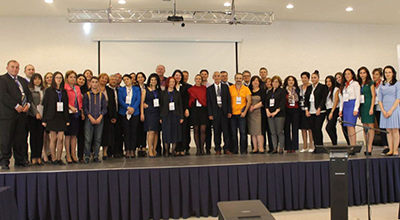
THE MONITORING OF TEMPUS+ MAHATMA AMD ARARAT PROJECTS AT GORIS STATE UNIVERSITY
Lana Karlova, Programme Coordinator, Edith Soghomonyan and AniTorosyan, Programme Officers from NationlErasmus+Office in Armenia and A. Papoyan, Deputy Head of Development Programs and Monitoring Department, RA Ministry of Education and Science, as well as S. Karabekyan, Education Expert were at GSU on June 7-8.
The monitoring of Tempus+MAHATMAamd ARARAT projects which was carried out by Lana Karlova, Programme Coordinator, Edith Soghomonyan and AniTorosyan, Programme Officers from NationlErasmus+Office in Armenia, took place on June 7.
The rector of GSU A. Ghukasyan, the staff of the Center for International Cooperation and Projects, the members of MAHATMA and ARARAT working groups as well as the representatives of the academic and administrative staff from GSU were present at the monitoring meeting.
The rector of GSU A. Ghukasyan welcomed the participants of the event and represented the tangible results, sustainability and possibilities of further cooperation in the frames of MAHATMA and ARARAT projects which had been implemented since 2012 at GSU. He particularly mentioned that the main outcome of MAHATMA had been the introduction and sustainable implementation of Master Academic Program of Education Management at GSU. Most of the graduates with this specialty work in the respective professional field. The curriculum and the academic programs had regularly been overviewed and updated. The rector also emphasized that the main guarantee to ensure the sustainability of the project was the cooperation between the partner universities of the project and the International Association for Educationalists would highly contribute to it.
As for the implementation of ARARAT project the rector spoke about it by mentioning that the tangible outcome of the project could be considered the capacities and skills of the academic and administrative staff gained in the result of trainings, University-Enterprise cooperation and the collection and creation of the data about the graduates. Even though the project is over the data are continually updated and the frames of cooperation are being expanded.
The Programme Coordinator of the National Erasmus+OfficeL.Karlova welcomed the participants and spoke about the projects by stressing the development and reforms in the educational institutions and systems, the creation of academic programs, the improvement of the management of HEIs as well as the effectiveness of the work implemented to ensure the consolidation of the links between the society and Higher Education in the frameworks of the implementation of the projects. She also referred to the students’ mobility at GSU and met some students who had taken part in the mobility as well as some graduates of Education Management.
The guests also had discussion about the mutual visits, trainings, exchange of best practices and registered outcomes in the frameworks of the projects with the members of the working groups of MAHATMA and ARARAT from GSU.
At the end of the first working day the guests visited the classrooms equipped with necessary information technologies in the result of the project to see and make sure to what extent the equipment purchased in the frame of the projects contribute to the education process and the sustainability of the projects.
On June 8, the experts of Higher Education Reforms held a seminar-meetingconcerning the creation and management of strategic plans for the regional HEIs of RA. The seminar was led by A. Papoyan, Deputy Head of Development Programs and Monitoring Department, RA Ministry of Education and Science, as well as S. Karabekyan, Education Expert who referred to the challenges connected with the HEIs, the consonant strategic steps, the purposefulness of internal self-analysis as well as the proper planning and design of the strategic plan for GSU.The discussions revealed the strengths and weaknesses of GSU, the main issues and the important strategic steps that should be taken in order to motivate the students’ mobility, the professional recruitment of the academic staff, the cooperation between the HEIs, the proper application of the resources, the implementation of professions meeting the requirements of the market, the inflow of the entrants and the progressive development of the university.
By summarizing the seminar the experts expressed their gratitude for the cooperation and willingness to meet again to discuss the new regulations for the development of GSU which would make true the vision of the university.
TEMPUS MAHATMA PROJECT FINAL CONFERENCE
TEMPUS MAHATMA Project Final Conference was held at the Armenian State Pedagogical University after KhachaturAbovyan on the 30th of September, 2016. Consortium partners from Georgia, UK, Italy, Germany, France and Czech Republic met again to present the achievements, tangible outcomes,good practice used in the project and further plans within the project’s 4-year implementation.
MAHATMA is a multi-country joint projectwhich aims at promoting reforms of higher education in Armenia and Georgia. 8 Master Programs were developed at partner institutions of Armenia and Georgia with the support of 6 European institutions and organizations. Master programs introduce new teaching and learning methods, student assessment approaches. Capacity building was conducted among academic and administrative staff, student mobility to European Partner HEIs as well as exchange of students were organized in the frameworks of the project.
The International Association for Educationwhich was established to promote the effective cooperation between the stakeholders, was also presented during the conference. Representatives from GSU,which is a partner of the project, were also participating in the conference: H. Petrosyan/Head of the Chair of Psychology and Pedagogics/, N. Safaryan/ Project trainer/, S. Hairapetyan/Person in charge for ICQA/, T. Ohanyan/Assistant at ICQA/, as well as the students of Education Management Master course A. Minasyan and A. Mkrtchyan.
Attached see Master Academ Programme of Education Management implemented at GSU
![]()
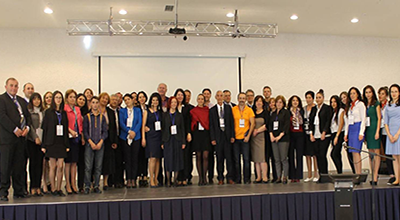
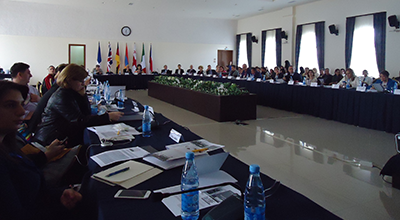
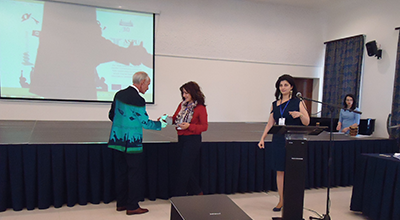
FINAL GOVERNING BOARD AND INTAEGB MEETING AT BATH SPA UNIVERSITY, UK
A FINAL Governing Board andIntAE GB MEETING within the frameworks of TEMPUS Mahatma project took place at Bath SPA University,UK, on 03-06 July,2016.Mahatma and IntAE GB members participated in the event. Rector A. Ghukasyan, and Project trainer N. Safaryan were representatives from GSU at the meeting. The aim of the event was: – to sum up the activities conducted and left within MAHATMA project before the final conference in Yerevan – to discuss the developments of the publications and set the final dates – to discuss the financial and technical issues within the project – to agree on the agenda and logistics for the final conference in Yerevan – to discuss the IntAE upcoming activities, Journal developments during the II GB meeting: Each of the lead partners was asked to prepare a brief presentation on the current status of the WP and focus on the activities to be conducted by the closure of the project if the WP was not completed.
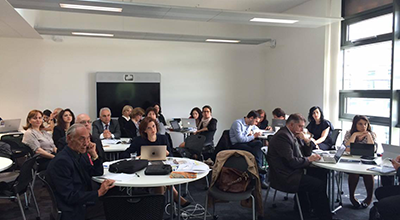
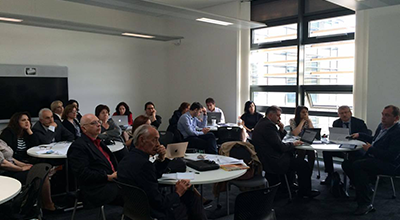
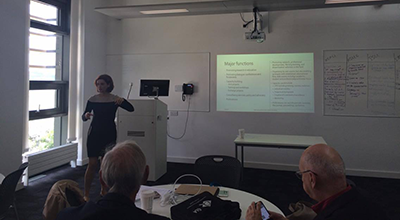
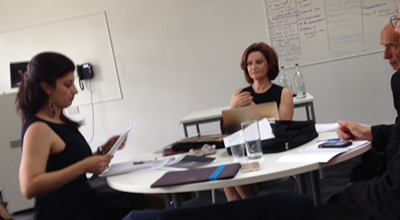
TEMPUS MONITORING VISIT AND ERASMUS+ INFORMATION SESSION IN GORIS STATE UNIVERSITY
On May 26-27, 2016 National Erasmus+ Office in Armenia (NEO-AM) staff Lana Karlova and Edith Soghomonyan had a monitoring visit and anErasmus+ Information Session atGoris State University. GSU management, the representatives of the academic and administrative staff as well as representatives of non-governmental organizations and employers from Syunik region were present at both the events. The purpose of the monitoring visit was to discuss the current state, development and sustainability of the past 3 Tempus (ARARAT, Cap4Com and MAHATMA) and 2 new ongoing Erasmus+ (LNSS and HERITAG) projects in which Goris State University is a partner institution. The meeting was also an occasion to present the results achieved within the years of the project cooperation. On the following day, May 27, Erasmus+ Information Session was organised in order to inform the local beneficiaries about the Erasmus+ Programme, in particular about the Erasmus+ Call for Proposals to be launched in October 2016 and on several actions relevant to the international dimension of Higher Education: Capacity Building in Higher Education (CBHE), International Credit Mobility and Jean Monnet Activities.
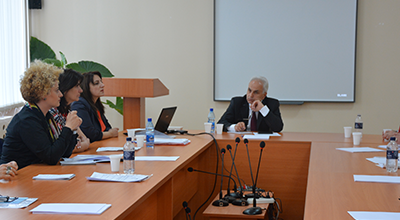
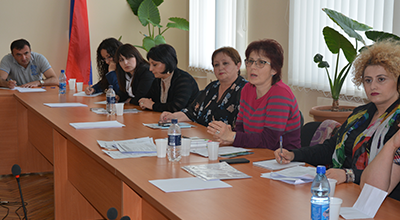
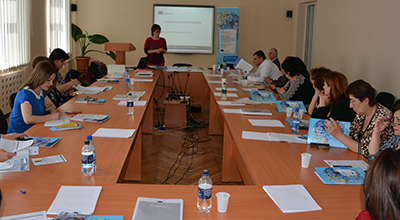
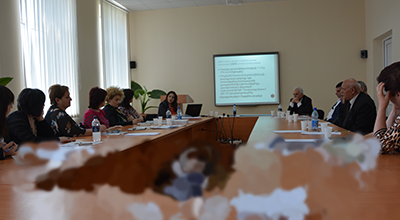
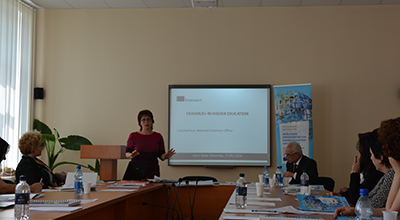
FIRST INTAE AND DISSEMINATION CONFERENCE, IBSU TBILISI
The first IntAE (International Association for Education) meeting was held to gather the Governing Board members of the Association to agree upon the IntAE core documents and finalize the activities related to its and International Journal operationalization. The event is scheduled at IBSU, Tbilisi, Georgia on 3rd of May 2016. On the following day, May 4, a dissemination conference took place at the same university whichenabled the project partners and stakeholders to have an overview of the project achievements and its impact on the partner activities. Vice-rector at GSU Z. Grigoryan and Project trainer N. Safaryan were participating in both the events.
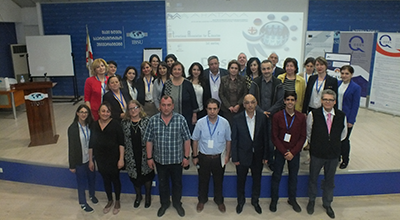
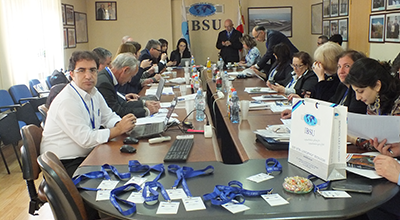
CBE EVENT AT ASPU
A Capacity Building Event(CBE)within MAHATMA project was conducted in GEORGIA and ARMENIA on March 17-18,2016.The event This is the fourth and the last training organized which will help the faculty members to revise their academic programs along with the recommendations from the QA Agencies and taking into consideration the topics to be delivered by EU partners. The topics were identified during the last coordination meeting and agreed with the consortium. Nine representatives from GSU were participating in the training: Z. Grigoryan/ Vice rector at GSU/, H. Petrosyan/Head of the Chair of Psychology and Pedagogics/, N. Safaryan/ Project trainer/, S. Hairapetyan/Person in charge for ICQA/, T. Ohanyan/Assistant at ICQA/, G. Stepanyan/ Lecturer at the Chair of History/, G. Minasyan/Head of the Chair of Economics/as well as the students H. Babayan/Economics/, and A.Nahapetyan/Education management/. The training were delivered by Milan Pol, MU,George Dafoulas,MDX and covered the following topics: – Monitoring and involvement of students in research process – Information technologies in educational management – How to promote the sustainability of the programme and the international mobility of students and teaching staff after the end of the project – Professional ethics (How to deal with students) etc.
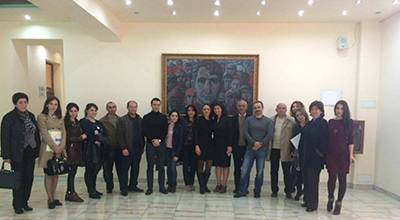

Goris State University is a partner University of the Erasmus+ “Library Network Support Services (LNSS): modernising libraries in Armenia, Moldova and Belarus through library staff development and reforming library services” Project.
Partners of the LNSS Project are:
- Public Administration Academy of the Republic of Armenia (PAARA) – Armenia
- Yerevan Brusov State University of Languages and Social Sciences- Armenia
- Goris State University-Armenia
- Limerick Institute of Technology – Ireland
- University of Crete – Greece
- The Pyramid Group – Germany
- Transilvania University of Brasov – Romania
- Academy of Public Administration of Moldova
- Alecu Russo Balti State University – Moldova
- Academy of Public Administration under the aegis of the President of the Republic of Belarus
- Belarusian State University- Belarus
- Brest State Technical University- Belarus
- Yanka Kupala State University of Grodno- Belarus
Associate Partners are:
- Electronic Library Consortium of Armenia- Armenia
- REM. Moldova Library Consortium-Moldova
- National Library of Belarus-Belarus
Training 1
English for specific purposes
In the frameworks of the Erasmus+ “Library Network Support Services (LNSS): modernising libraries in Armenia, Moldova and Belarus through library staff development and reforming library services” Project a training “English for specific needs” was held for the library, faculty and administrative staff of GSU. The trainings were conducted by the representatives of the project, EU trainers professor Gerard Cullen and Sabrina Hutter. In order to organize the training more efficiently the trainees were split into two groups according to their level of English: beginners and intermediate to advanced. The beginners’ group first took a test which revealed their level of English. Afterwards the trainer Sabrina Hutter helped the trainees to improve their English through a range of grammatical and vocabulary exercises and tasks by using effective methods of teaching. The trainer of the intermediate-advanced group Gerard Cullen introduced the technique of CV writing, public speaking and presentation making through various presentations. The trainees applied and practiced the gained knowledge and skills by writing their own CVs and creating presentations on various topics and representing them. At the end of the two-day training session the participants were awarded certificates.
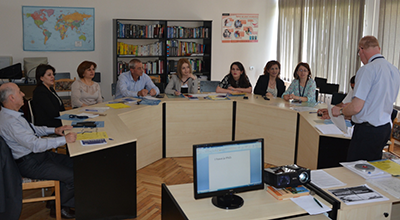
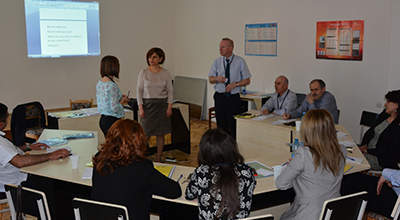
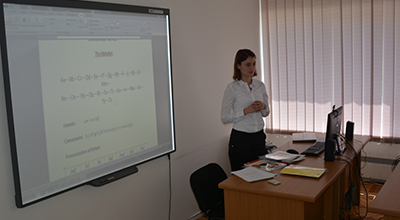
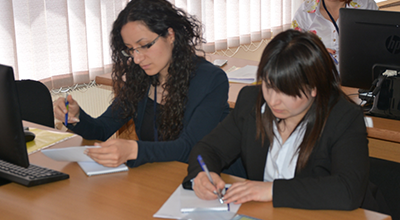
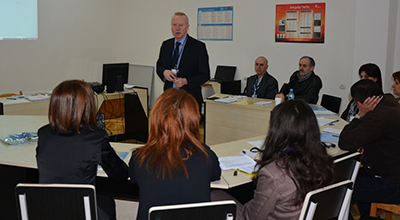
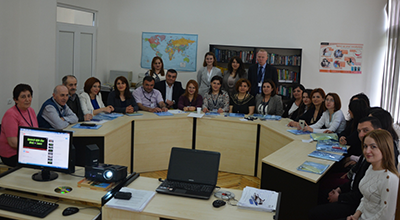
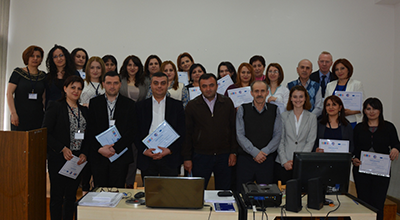
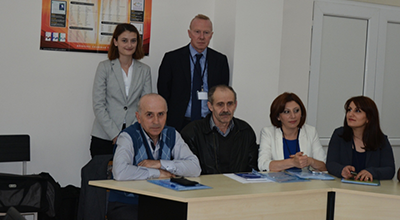
Training 2
In the frameworks of the Erasmus+ “Library Network Support Services (LNSS): modernising libraries in Armenia, Moldova and Belarus through library staff development and reforming library services” project a two-day training “English for specific needs” was held for the library, faculty and administrative staff on June 21-22 at GSU . This was the second round of trainings which were conducted by the representatives of the project Professor Angela Repanovici (Transilvania University of Brasov) and Dr. Manolis Koukourakis (Library Director, University of Crete). The rector of GSU, Professor A. Ghukasyan welcomed the participants of the training and mentioned the importance of the project in the process of effective organization and quality assurance of education. He particularly noted: ”It is impossible to imagine modern universities without rich library funds, comfortable reading rooms, educational and methodical electronic resources, inter-library information system and an adequate level of library service. Taking into account the professional skills of the trainers we hope that the trainees will gain a lot from the training to direct their professional activities properly. We are sure that the efficiency and sustainability of the project will give a desired result.” In general, the training consists of 8 modules the first two of which were represented during the previous training in May. The six modules represented at the second training are related to the following topics:
- Library and library staff management
- Communication, time management and presentation making skills for library and academic staff
- Information literacy and research skills
- Innovative online library services corresponding to the standards of the libraries of the 21st century
- Electronic library
- Access to the library for learners with special needs
- Improvement policy directed to the enrichment of the library databass
- Effective use of information resources
- Copyright and plagiarism issues
- Using Bibliographic software for your referencing and research
- Becoming a Subject Liaison Librarian: skills for collaborating with Academic staff
The interactive methods used during the trainings contributed to the formation of information and practical skills among the trainees as well as enriching their professional knowledge. The participants of the training expressed their gratitude and willingness to participate in the upcoming trainings organized in the frameworks of the project. At the end of the training the participants were awarded certificates. Afterwards the training was summarized by a round table discussion with the rector of GSU.
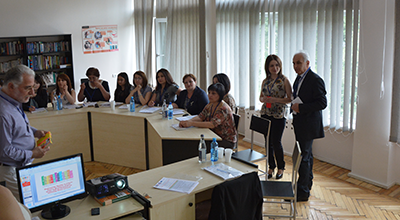
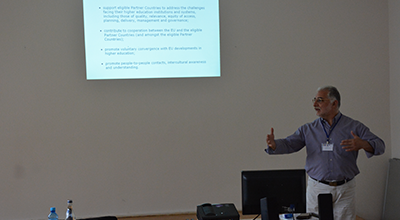
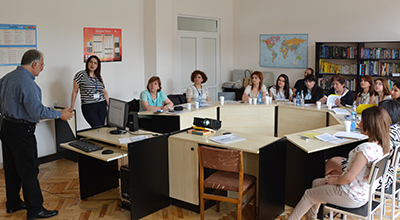
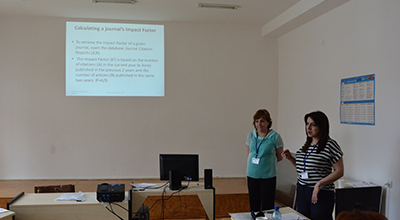
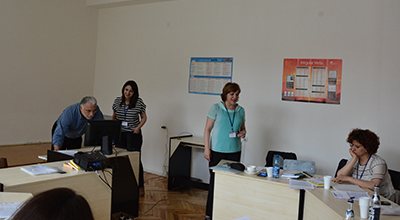
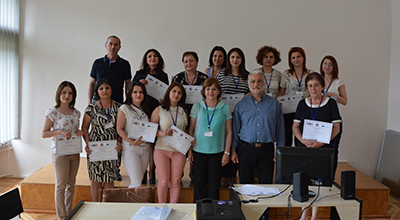
Limerick
In the frameworks of Erasmus+LNSS project action plan the main trainings for curricula development were held at Limerick Institute of Technology (Ireland) from 22 August to 2 September, 2016, The representatives of the LNSS project consortium members from 9 educational institutions: librarians and professors from Armenia, Belarus and Moldova attended the trainings of the development of eight training modules for librarians. Naira Safaryan (project coordinator) and Alina Ghazaryan (librarian)from GSU participated in the trainings. The training was carried out under the supervision and with the consultation of the EU trainers and library experts Jerald Cavanagh, Padraig Kirby from Limerick Institute of Technology (Ireland), Gerard Cullen from the Pyramid Group (Germany), Angela Repanovici from Transylvania University (Romania) and Manolis Koukourakis from Crete University (Greece). The representatives of the nine consortium member universities designed and presented the strengths and weaknesses (SWOT analysis) of the university libraries of the three countries, as well as developed the drafts of the eight training modules for librarians with the support of the European partners. Another important activity was to develop and represent the draft version of the National Awareness Days which are anticipated to be organized in Armenia, Moldova and Belorus in 2017. The participants of the trainings also visited the Public Library of Limerick, the library of LIT and Glucksman Library at Limerick University.
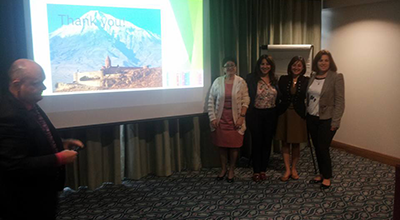
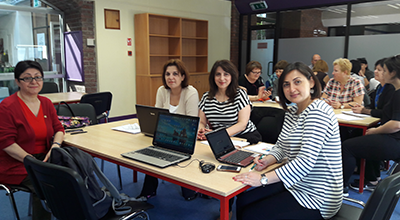
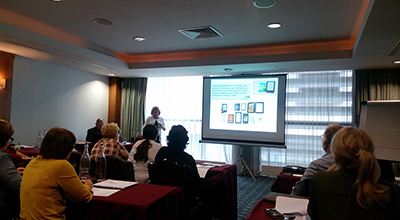
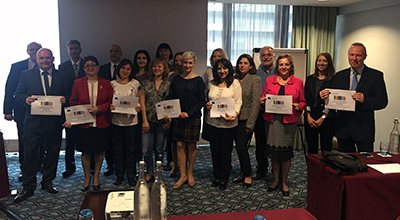
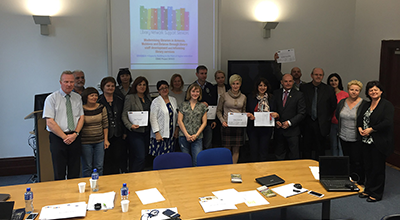
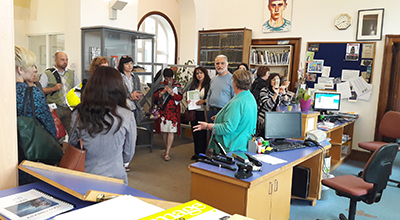
The pilot training of Module 1
In the frameworks of the Erasmus+ “Library Network Support Services (LNSS): modernising libraries in Armenia, Moldova and Belarus through library staff development and reforming library services” Project a pilot training “English for specific needs” was launched at GSU. The training was designed and held for the library, faculty and administrative staff of GSU as well as for some representatives of the community librarians.Dr Angela Repanovici (Transylvania University of Brasov, Romania) and Dr Manolis Koukourakis (University of Crete, Greece) were also present at the training. This was their second project monitoring activity at GSU. They greeted the participants of the training and expressed their satisfaction byseeingand appreciating good results of the implemented work in the framework of the project. The guests and participants were welcomed by the rector of GSU Mr. Ghukasyan who highly appreciated the tangible results of the project and work directed to the modernization of libraries. He stressed the importance of including the community librarians in in the project. The coordinator of the project at GSU Naira Safaryan also welcomed the guests and the participants of the training and represented a report and presentation about the implementation and results of the work at GSU. She also represented the general description and objectives of Module 1(English for Specific Purposes: Libraries, library terminology, library access). The chief librarian of GSU library Nuard Shalunts spoke about the GSU library, the newly renovated reading room and the participation of the librarians in the project. A student from the Faculty of History Astghik Isakhanyan made an interesting presentation about modern libraries and the importance of E-libraries. The first lesson of Module 1 was taught by the trainer Hasmik Mirzoyan.
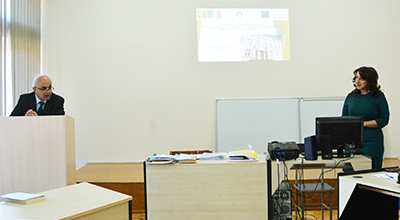
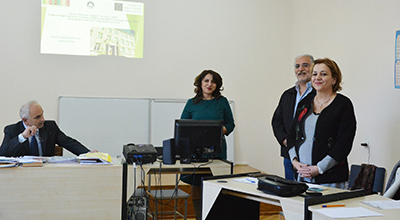
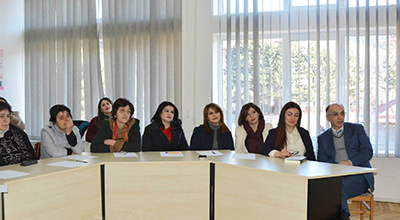
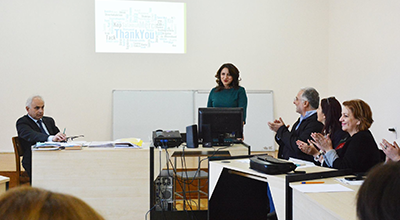
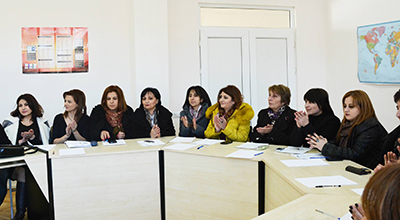
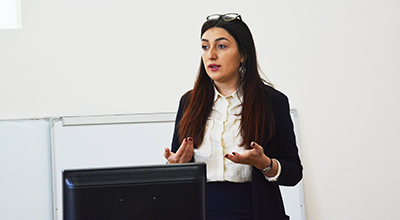
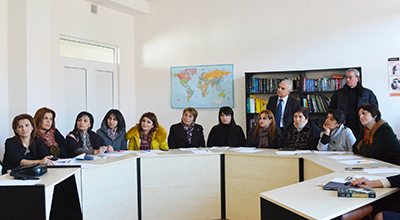
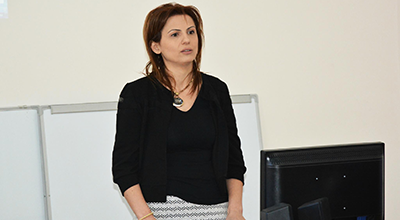
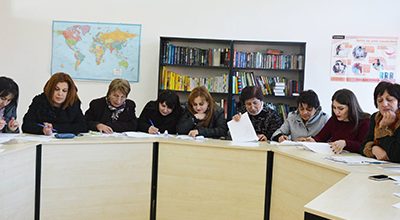
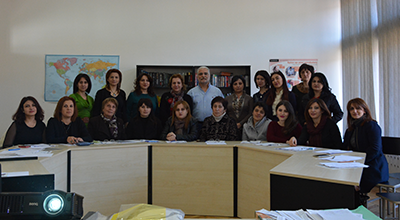
The pilot training of Module 1 (English for Specific Purposes: Libraries, library terminology, library access) in the frameworks of Erasmus+ “Library Network Support Services (LNSS): modernising libraries in Armenia, Moldova and Belarus through library staff development and reforming library services” project, which was launched on November 28, 2016, came to an end. The representatives of GSU library, academic and administrative staff were participating in the last training. The trainers N. Safaryan and H. Mirzoyan assigned the trainees various oral and written tasks to summarize the training and to test the participants knowledge. The trainees also filled in a special student’s evaluation form and were awarded certificates. At the end of the training the participants expressed their gratitude to the trainers for the effective course and wished that similar trainings would have a continuous character.
A workshop-meeting in Dresden in the frames of LNSS Project
On March 1-3, 2017, TU Dresden (one of the leading universities in Germany and the largest one in Saxony) hosted the representatives of consortium member universities from EU, Armenia, Moldova and Belarus in a workshop-meeting dedicated to the annual reports of the activities in the framework of the Project during the first year of its implementation. The project coordinator Naira Safaryan and the trainer HasmikMirzoyan from GSU participated in the meeting. The Project coordinator T. Khechoyan delivered a general report on the Project activities. The representative-members of the Consortium from nine universities of three Eastern Partnership Countries (Armenia, Moldova and Belarus) and four universities of European Union (Ireland, Germany, Romania and Greece) made reports on their activities since the beginning of the project and presented their drafts of National Library Awareness Day. The workshop took place together with the representatives of the consortium of a similar LNSS project implemented in Western Balkans. It provided an opportunity to draw parallels between the activities of LNSS projects of the two regions and exchange their experience and skills. The participants also visited Saxon State and University Library, Dresden (SLUB). Along with its collection of about nine million pieces, it also comprises the largest public archive in Germany and a museum of ancient manuscripts.
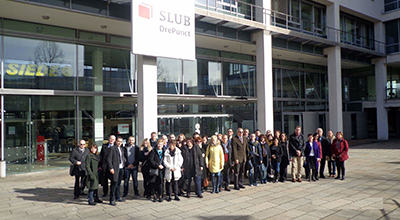
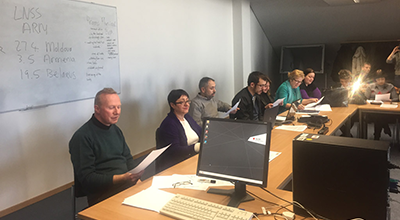
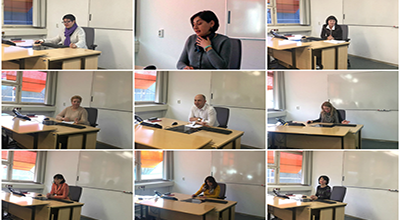
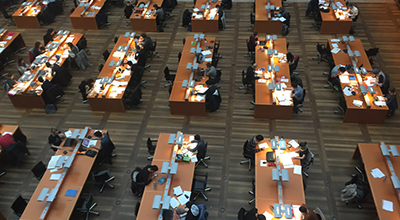
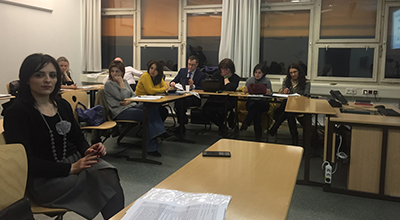
The presentations and discussions of the activities implemented in the frameworks of Erasmus+ LNSS (Library Network Support Services: modernizing libraries in Armenia, Moldova and Belarus through library staff development and reforming library services) and HERITAG (Education interdisciplinary Reform in Tourism management and Applied Geoinformation curricula) projects took place at the conference hall of GSU, on April 11, 2017. The rector of GSU, representatives of the academic and administrative staff as well as guests from the town hall and local NGOs were present at the event. The coordinator of LNSS at GSU N. Safaryan delivered a report on LNSS project objectives, the activities implemented in the frames of WPs, trainings, SWOT analysis, Module 1(English For Specific Purposes: Library Context, Libraries, library terminology, terminology around library access), the piloting of the module and its results, the newly renovated and equipped library reading hall(as co-funding in the project), the preparation work for the National Awareness Day and future activities. The coordinator of HERITAG project at GSU H.Babayan made a presentation about the mutual visits and cooperation results of the partner countries, the survey at the beginning of the project, the involvement of the stakeholders and the activities of the members of GSU working group. As a key member of the project working group G. Minasyan spoke referring to the objectives of the project, the future master specialty, the clarification of the course materials and subjects and the planned actions for the creation of a GIS lab at GSU. The reports and presentations were followed by active discussions and questions concerning the strategic plans, objectives and expected outcomes of LNSS project, the creation and digitization of E-library, the threats revealed in the result of SWOT analysis, the market demand of the future GIS specialists in general and particularly in the region, the issue of the awareness of the students and stakeholders, the creation of the Advisory Board and involvement of new members in the projects.
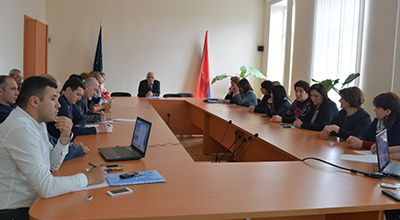
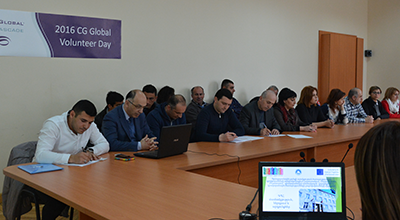
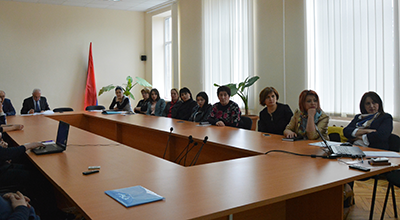
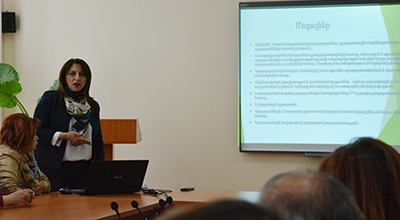
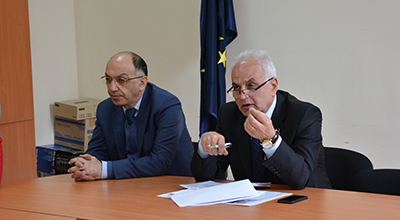
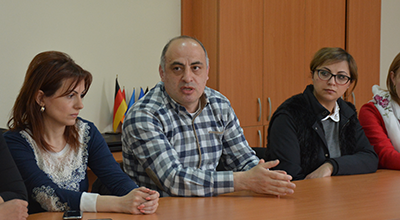
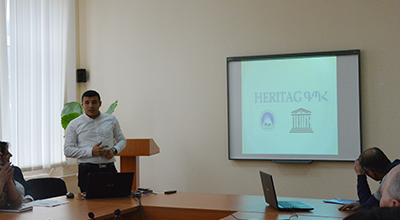
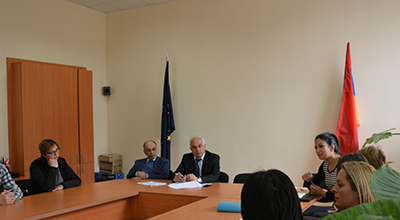
EVENTS DEVOTED TO LIBRARY AWARENESS DAY AT GSU
A range of events devoted to Library National Awareness Day under the slogan “A gateway to knowledge” was held on May 3, 2017, at Goris State University in the frameworks of Erasmus+Library Network Support Services (LNSS): modernizing libraries in Armenia, Moldova and Belarus through library staff development and reforming library services Project. The participants of the event were welcomed by the rector of GSU A. Ghukasyan who emphasized the purpose of the day, the role and importance of the awareness for the best organization of the library work. The coordinator of the project at GSU N. Safaryan delivered a report about the objectives, the implementation of the work packages, the trainings and workshops within the project, its tangible results, the measures undertaken aiming at the modernization of the library as well as the Library National Awareness Day. The chief librarian of the library N. Shalunts made a presentation about the involvement of the GSU library in the project, the mutual meetings, discussions, trainings and the exchange of best practices among the consortium member university libraries and librarians of the project, the newly reconstructed reading hall as well as the preparation work for the digitization process at GSU library. The secretary of the Students’ Scientific Association, a four-year student of the Faculty of Humanities and Social Sciences S. Alaverdyanmade an impressive informative presentation about the most beautiful and unique libraries of the world and her perception of the libraries in general. The first part of the event wassummarized by active discussions, exchange of opinions and useful suggestions by the representatives of GSU academic and administrative stuff, town municipality, community librariesand Media. The second part of the event took place at the GSU library reading hall where the participants students welcomed the guests and made a literary-cultural presentation about ancient libraries and the first printed Armenian books as well as the life and works of the great Armenian poet Hovhannes Shiraz. This was followed by a flash-mob event initiated and organized by the students. The purpose of the flash-mob was to inform the community about the Library Awareness Day.
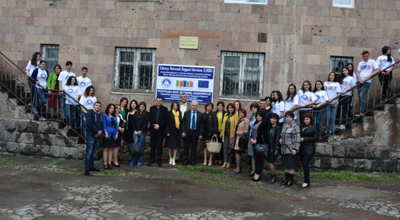
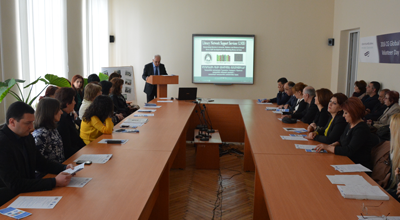
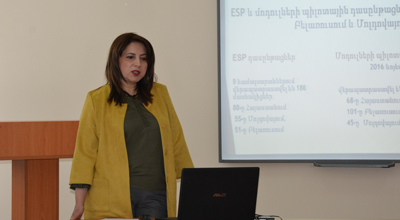
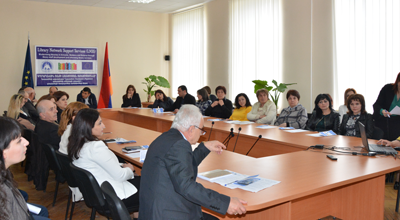
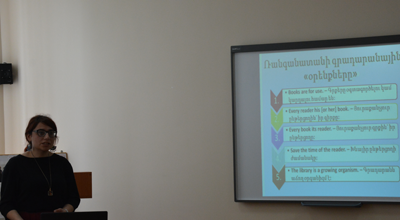
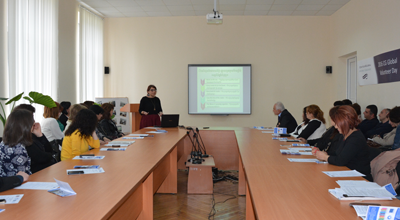
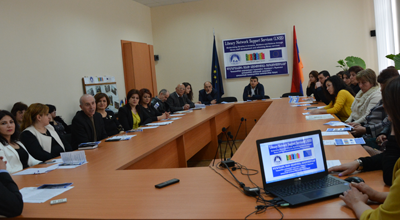
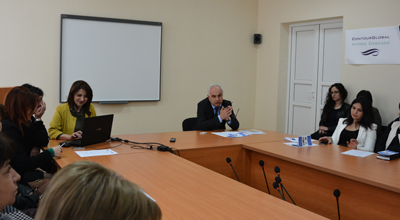
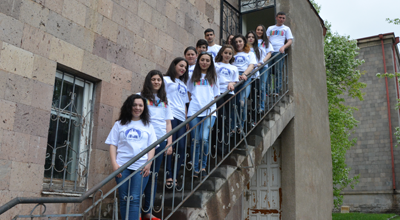
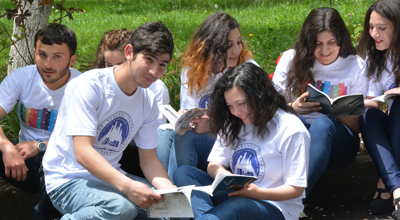
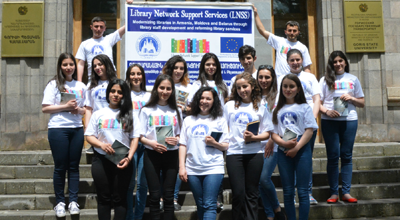
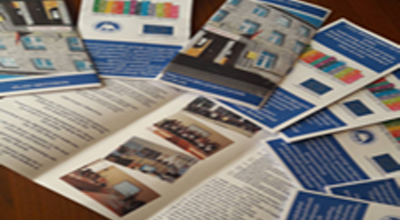
QA TRAINING WEEK AT THE UNIVERSITY OF CRETE, RETHYMNO
In the frameworks of the Erasmus+ “Library Network Support Services (LNSS): modernizing libraries in Armenia, Moldova and Belarus through library staff development and reforming library services” Project Quality Assurance training was held at the University of Crete, Rethymno, on September 24-30, 2017. EU experts and the representatives from the project partner institutions were participating in the training. The event took place at the library building of UOC. The project coordinator Tereza Khechoyan delivered a welcome speech and made a presentation on the course, activities, overall progress and tangible outcomes of the project so far by stressing the success in developing the eight modules and their piloting at the partner institutions, the successful organization and implementation of the NADs in the partner countries, as well as the trainings and the impressive numbers of the trained staff. The trainings covered the following topics: • Quality Management and Quality Assurance • EU Quality standards and Quality Assurance for managing EU funded projects • EU Quality standards and QA for Higher Education. • EU Quality standards and QA for Public Sector Institutions • Risk management • English as a Medium of Instruction (EMI). EU Quality standards and QA for Higher EducationManolisKoukourakis (UOC) represented ManolisKoukourakis (UOC) and Liliana Rogozeva (Vice rector at the University of Transylvania) represented the QA related activities and implementation processes in their respective HEIs. ManolisKoukourakis(UOC) , Angela Repanovici(University of Transylvania) presented their SWOT analyses of the NAD in Armenia and Gerry Cullen(TPG) presented that of Moldova and made their remarks and gave recommendations. During the training week, each PC partner institution represented the activities and impact of the National Awareness Days. After the QA trainings, the partners were assigned to review, update and choose another module for the second piloting according to their priorities and needsThe terms and schedules were discussed and it was decided that the second piloting should start in November and finish by December 10. Gerry Cullen suggested that the modules be integratedinto the university’s curricula, library and administrative staff recruitment trainings etc. He also made a presentation “English as a Medium of Instruction” As more universities use English as a Medium of Instruction (EMI), the need for structural changes, different methodologies is becoming more urgent. Gerry Cullen spoke about their experience at TU Dresden and the challenges and ways of overcoming them. He emphasized the importance of the introduction and implementation of ESP courses in various academic programs as well as staff recruitment and training programs at any academic institution in order to be responsive to the dynamic changes in the competitive global higher education market For the purpose of experience exchange, the participants of the trainingwere invited to take a tour at UOK library and the newly constructed Central Public Library of Rethymno. They were introduced to theOpen access, Reference, Short loan and Close accesscollections, the archives, the preservation departments, the European documentation centre, as well as the museum of the library. The collection of rare books, which deal with Greek history and civilization and the wide collection of periodicals were especially impressive. The participants were awarded certificates of participation in QA trainings.








Erasmus+ Information Days at Goris State University
On October 26-27, 2017,Erasmus+ Information Days were held atGoris State University. Rector of GSU A. Ghukasyan, National Erasmus+Programme CoordinatorLana Karlova, Programme officers Edith Soghomonyan and AniTorosyan, as well as Expert in European Studies and HE Kristine Gevorgyan were present at the two-day event.On the first day of the events Lana Karlova announced about the publishment of Erasmus+ NEW Call for Proposals and represented about the applications and proposals for K2, 2018 /Capacity Building Projects/based on the national and regional priorities. The second session of the day related to the two ongoing projects at GSU; Erasmus+ “Library Network Support Services (LNSS): modernizing libraries in Armenia, Moldova and Belarus through library staff development and reforming library services” and HERITAG (Education interdisciplinary Reform in Tourism management and Applied Geoinformation curricula), their implementation, problems, progress, the current course of the digitization and expansion of the library and the creation of a geoinformation laboratory at GSU. On the second day of theevent Expert in European Studies and HE Kristine Gevorgyan made a presentation on the steps of applying for Erasmus+ Jean Monnet Actions and represented the experience of YSU in it. Erasmus+Programme officer AniTorosyan represented the opportunities of the International Credit Mobility for both the academic staff and the students (including Traineeships as a novelty). During the second session Erasmus+Programme officer Edith Soghomonyan made a detailed presentation about Erasmus Mundus Joint Master Degrees (EMJMDs) for the students of GSU. She spoke about the application procedure and some statistics on the Armenian students’ participation in this project.
Piloting of Module 4: “Information Literacy and Research Skills”
In the frameworks of the Erasmus+ “Library Network Support Services (LNSS): modernizing libraries in Armenia, Moldova and Belarus through library staff development and reforming library services” Project a pilot training “Information Literacy and Research Skills” was launched at GSU on November 27, 2017. The training was designed and held for the library, faculty and administrative staff of GSU, as well as for some representatives from the library of the House of Culture after GusanAshot and Children’s library of Goris community. The EU experts Dr Angela Repanovici (Transylvania University of Brasov, Romania) and Dr. ManolisKoukourakis (University of Crete, Greece) were also present at the training. This was their third project monitoring visit to GSU. The guests and participants were welcomed by the rector of GSU Mr. Ghukasyan who emphasized the start, importance and expected outcomes of one of the most important events in the frameworks of this international project. The coordinator of the project at GSU Naira Safaryan also welcomed the guests and the participants of the training and made a presentation about the module, its description and objectives. Module 4 “Information Literacy and Research Skills” covers the following topics: • Information Technologies • The Importance, development tendencies and application of the Internet • The role of libraries in Information Literacy & Research skills • Digital Literacy • Information Search Process in the modern world. • Search systems; Scopus, Web of Science, Science Direct • Information Depositories and databases • Library Development Strategy • Automatic Management Systems for Libraries (KOHA) At the end of the first session of the day Dr. ManolisKoukourakis took the floor and positively spoke about the content, organization, active participation of the trainees, the professionalism of the trainers in particular and the visible results and progress of the work implemented in the frames of the project.
Piloting training of Module 4 “Information Literacy & Research skills” at GSU
The piloting training of Module 4 “Information Literacy & Research skills” in the frames of Library Network Support Services (LNSS): modernizing libraries in Armenia, Moldova and Belarus through library staff development and reforming library services) project came to an end. The librarians, the representatives of the academic and administrative staff of GSU, as well as some representatives of community libraries and the library of the House of Culture were participating in the trainings.
The trainings were held on November 27-December 10 at GSU.
DAY 2
5. Electronic Materials, Files and their types/Arthur Vardazaryan/
6. Information Depositories and databases
7. Standards for Libraries in Higher Education /Naira Safaryan/
8. Research Skills, Phases of research process, Scientometrics, Impact factor for journals, H-index for authors, Information Management Programs/A.Ordyan, N. Safaryan/
DAY 3
9. The Internet as a Means of Teaching /A. Vardazaryan, N. Safaryan/
10. E-books
11. Automatic Management Systems for Libraries /A. Ordyan/
DAY 4
12. Online Libraries, Creation and Development /A. Vardazaryan/
13. Library Strategy of Development /N. Safaryan/
14. KOHA Library Management System /A. Ordyan
The trainings were held in the classrooms equipped with computers so that the participants of the trainings could have the opportunity to apply theoretical knowledge in the practice.
The trainings were delivered by N. Safaryan (Person in Charge of International Cooperation and Projects and LNSS Coordinator), A. Vardazaryan(IT Specialist) and A. Ordyan (Assistant Professor at the Chair of Mathematics and Informatics and Project Working Group Member).
On the last day of the trainings, GSU Rector A. Ghukasyan was present at the closing part. He delivered a speech by emphasizing the importance of holding such trainings at GSU. After the heated discussions and exchange of opinions about the importance and knowledge gained during the trainings, as well as the attempts of applying the library management automatic system(KOHA) by the participants of the training, the rector noted that it is vital to use this knowledge and skills in practice, i.e. in the introduction of the library management automatic systems into the library, the E-library, as well as the reconstruction and updating process of the Library division of GSU official website.
The participants of the training were awarded certificates.
Erasmus + LNSS monitoring meeting at PAARA
On April 5, 2018 a monitoring meeting in the frames of “Library Network Support Services (LNSS): modernizing libraries in Armenia, Moldova and Belarus through library staff development and reforming library services” project took place at PAARA. The Coordinator of the project at GSU N. Safaryan, the Chief of the library N. Shalunts and the project working group members A. Ordyan and A. Dinunts represented GSU at the meeting. The representatives of the academic and administrative staff and students from PAARA were also present at the meeting. The monitoring visit was initiated by the representatives of National Erasmus+Office in Armenia Lana Karlova (Programme Coordinator) and Edith Soghomonyan (Programme Officer).
The coordinator of the project T. Khechoyan(PAARA) represented the activities implemented during the first two years of the project. The local coordinator of the project at GSU N. Safaryan spoke about the activities implemented at GSU in the frames of the project, particularly the piloting trainings of two modules: ENGLISH FOR SPECIFIC PURPOSES (LIBRARIES, LIBRARY TERMINOLOGY, LIBRARY ACCESS) AND INFORMATION LITERACY AND RESEARCH SKILLS, National Awareness Days (May 3, 2017 and the upcoming June 1, 2018), the qualitative and quantitative outcomes of the projects, the purchase of the equipment etc. A. Ordyan and N. Shalunts spoke about the digitization process and the implementation of the library management system KOHA at GSU library. A.Dinunts gave a detailed description of the positive outcomes and impact of the project at GSU.
This was followed by questions addressed to the participants of the meeting aiming to reveal their opinions and points related to the project implementation at the partner institutions. Some problems relating to the organization of the National Awareness Day June 1, 2018, the purchase of the new equipment and literature were also discussed.
National Erasmus+Office in Armenia is going to represent a report on the results of the monitoring to the Education, Audiovisual and Culture Executive Agency(EACEA), which in its turn will produce a report and an evaluation and represent to the member institutions of the consortium.
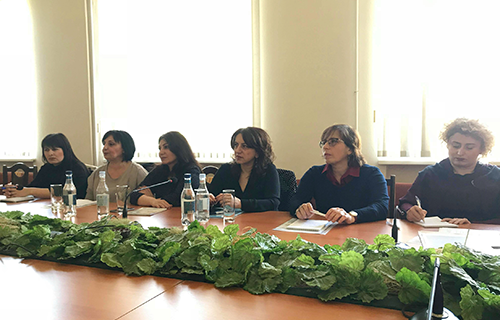
A workshop devoted to the National Awareness Day of Libraries at GSU
A workshop devoted to the National Awareness Day of Librariesin the framework of Erasmus+ “Library Network Support Services (LNSS): modernizing libraries in Armenia, Moldova and Belarus through library staff development and reforming library services” project took place at Goris State Universityfrom May 31 to June 1, 2018. Armenian institutions participating in the project as well as European partners and the staff of regional and municipal libraries of Syunik were participating in the event.
A master class ‘How to become a better teacher by using information and communication technologies’, which was led by EU experts Angela Repanovici (Transylvania University of Brasov, Romania) and ManolisKoukourakis (University of Crete, Greece) on May 31.
At the opening of the workshop, ArtushGhukasyan, Rector of GSU delivered a welcoming speech by appreciating the decision of holding the National Awareness Day events at GSU. By referring to LNSS project, the rector emphasized the main points related to the digitization and modernization of libraries, the enrichment of the electronic collections, the development of the professional skills and capacities of the library staff, the acquisition of the necessary equipment for the libraries and, most importantly, the integration in the national and international library networks, which make LNSS an ambitious and yet a justified project.ArtushGhukasyan, Rector of GSU and Naira Safaryan presented the activities implemented at GSU in the frames of the project, tangible outcomes as well as the future action plan.
ArsenLokyan, Rector of Public Administration Academy of RA, which is the project coordinating institution, also greeted the participants of the workshop and expressed gratitude for the warm welcome by GSU. By highly appreciating the close cooperation and friendly relationships between the partners, Mr. Lokyan also thanked the Erasmus+LNSS management and the European partners for the assistance and necessary consultancy during the project implementation period. He also referred to the main goal of LNSS which intends to the development of the libraries, modernization and improvement of the quality of library services, which in its turn, will contribute to the development of the education etc.
Mrs. TerezaKhechoyan, Vice-rector of Public Administration Academy of RA and Coordinator of LNSS project started her speech by expressing her gratitude to the EU experts Gerard Cullen, Angela Repanovichi, ManolisKoukourakis, Jerald Cavanagh and Padraig Kirby who represent the ‘Pyramid’ group (Germany), Transylvania University of Brasov (Romania), University of Crete (Greece) and Limerick Institute of Technology (Ireland) for the great assistance in the project.
Mrs. Khechoyan presented the achievements of the project over the past three years: the trainings for librarians, academic staff and students, the eight modules aiming to train the library staff designed by the partner institutions and two pilot trainings for librarians, which have been implemented at the partner universities of the consortium in Armenia, Belarus and Moldova.
The workshop comprised the following topics:
1.”Digital libraries of Armenia. Access to international scientific databases in Armenia” – Anna Chulyan, Head of YSULS Library; Armenia
2.”Application of Web 2.0 Technologies and Social Networks in Libraries” – ArmineVardanyan, bibliographer at YSULS Library; Armenia
3.” Visibility and impact of scientific production” – Angela Repanovici Prof.dr.at Transilvania University of Brasov, President of the Information Literacy section of the Romanian Library Association; Romania and ManolisKoukourakis, Library Director, University of Crete; Greece
4.”Combining Synergies – LNSS and ASPIRE” – Dr. Gerard Cullen, Germany
5.”Improving quality of library services”-ArturVardazaryan, New Horizon NGO, Armenia.
At the end of the workshop day A. Lokyan – Rector of Public Administration Academy of RA, and A. Ghukasyan – Rector of Goris State University signed an Agreement of Cooperation, which aims at drafting and realizing mutually beneficial projects in the sphere of education and science.
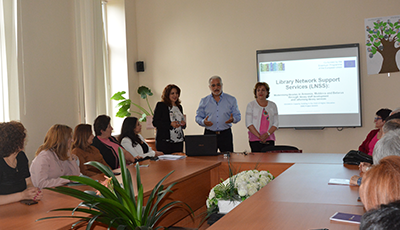
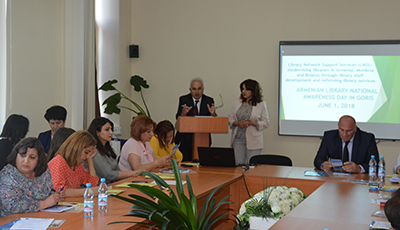
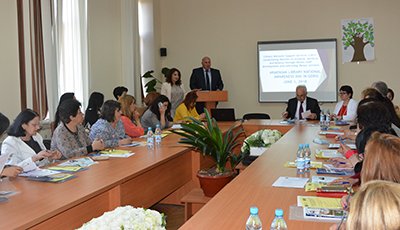
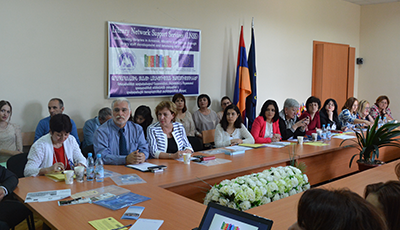
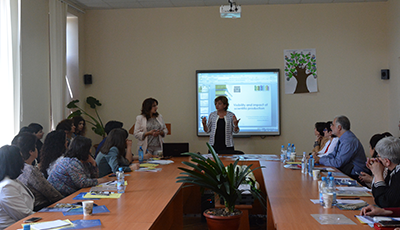
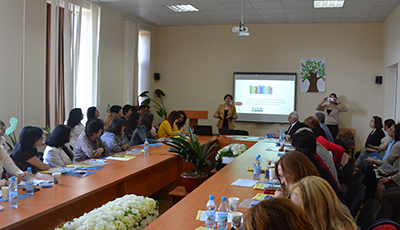
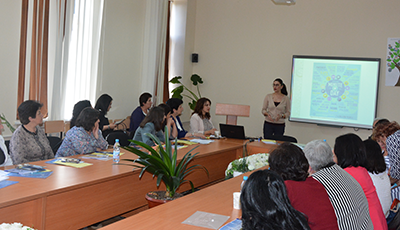
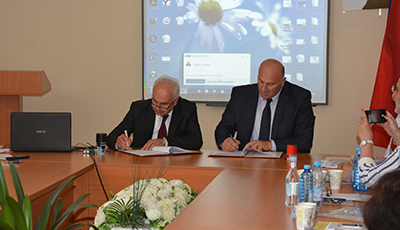
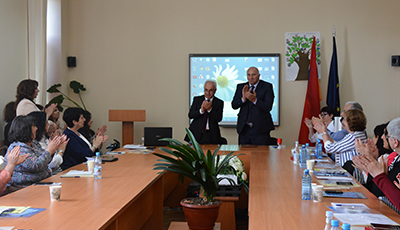
”English as a Medium of Instruction” Training at GSU
A two-day training ”English as a Medium of Instruction” in the framework of Erasmus+ “Library Network Support Services (LNSS): modernizing libraries in Armenia, Moldova and Belarus through library staff development and reforming library services” project took place at Goris State University from June 4 to 5, 2018. The training targeted at the academic, administrative and library staff of GSU. It aimed to improve and strengthen the knowledge of English as well as to develop communication skills and the ability to use English as a means of instruction. The trainings were held by EU experts Gerrard Cullen and Valeria Racheva.
At the beginning of the first day of the trainings Gerrard Cullen delivered a speech by highly appreciating the willingness of GSU staff to learn English as the knowledge of English is vital in the processes of internationalization, fostering the staff and students’ mobility etc. By referring to the practice of the organization of the teaching processes at European HEIs, Gerrard Cullen mentioned the fact that many of the courses in various specialties are currently delivered in English as a considerable part of the students are from abroad.
On the second day of the training the participants of the training Lilit Atabekyan, Dean of the Faculty of Natural Sciences, GurgenMinassyan, Acting Head of the Chair of Economics and ArpineOrdyan, Assistant Professor at the Chair of Mathematics and Informatics delivered lectures and made presentations in English by using the methods and instructions given by the experts. This was followed by an interesting discussion.
Around 40 participants were awarded certificates for the participation in the trainings.
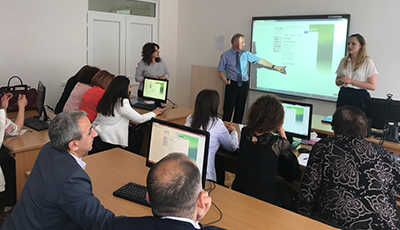
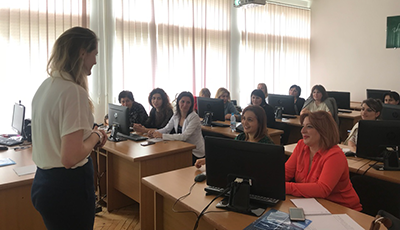
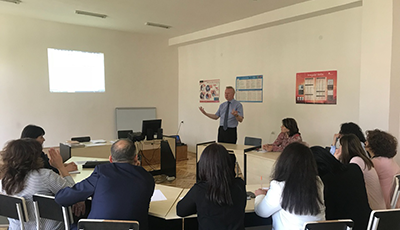
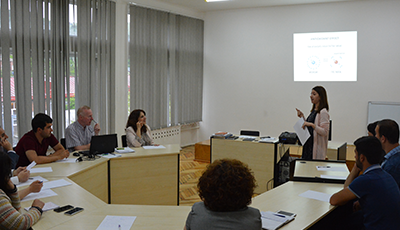
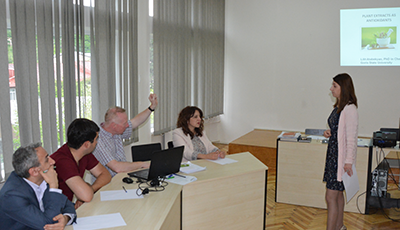
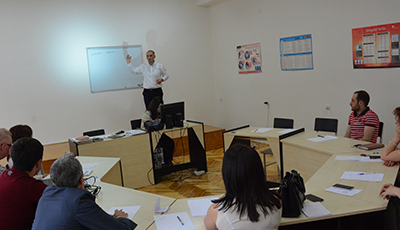
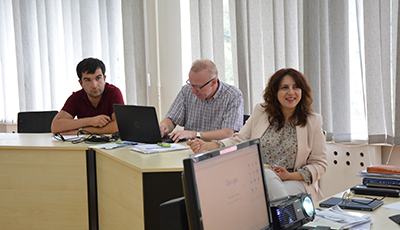
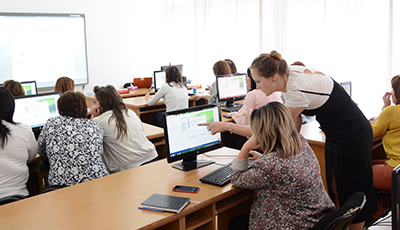
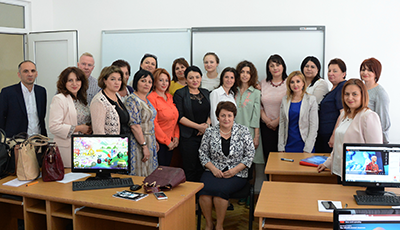
LNSS FINAL CONFERENCE
Erasmus+ “Library Network Support Services (LNSS): modernizing libraries in Armenia, Moldova and Belarus through library staff development and reforming library services” Project final Management Meeting and Conference took place in Moldova on October 3-5, 2018.
The Academy of Public Administration of Moldova hosted the representatives of member institutions of the Project from Armenia, Belarus, Moldova, Ireland, Germany, Romania, Greece, the Ambassador of Armenia in Moldova, the representatives of Erasmus Office in Moldova and other respectable guests.
The project local coordinator N. Safaryan, the GSU Chief of the library N. Shalunts and the librarian A. Tangyan represent GSU at the event.
Oleg Balan, Rector of Academy of Public Administration of Moldova, ArsenLokyan, Rector of Public Administration Academy of RA and Claudia Melinte, Head of National Erasmus+ office in Moldova, greeted the guests. PAARA Vice-rector and LNSS Project coordinator TerezaKhechoyan presented the activities and achievements of the Project during the recent three years.
The local coordinators of all institutions of the consortium represented detailed reports on activities carried out within the lifetime of LNSS, Project’s overall achievements, tangible outcomes and impact on their institutions, the design of 8 modules, the implementation of pilot and other trainings, the purchase of the equipment, the new library services, the project official website etc.
GSU local coordinator N. Safaryan particularly referred to the importance of the availability of newly reconstructed(cofounding) library reading hall which is reequipped with the equipment purchased by the project fund and has made it possible to improve the library services, to digitize the databasese and integrate into the local and international library network. She also spoke about the high awareness of the project and the availability of prerequisites and beneficial conditions for present and future cooperation and relations with the community and regional libraries. The various trainings within the project contributed to the development the professional capacities and skills not only among the GSU academic, administrative and library staff but also those of community libraries.
On October 4 the participants of the conference were hosted by Alecu Russo Balti State University. The representatives of European partner institutions presented the results of their activities. Gerard Cullen and Angela Repanovici spoke on the rationale of EMI in LNSS. The Irish partners Gerald Cavanagh and Padraig Kirby touched upon the participation of Limerick Institute of Technology in the Project. Angela Repanovici from Transilvania University of Brasov made a presentation ”LNSS Armenia, Belarus and Moldova Survey: Methodology and Results at the End of the Project”. ManolisKoukourakis, Head of the library of the University of Crete presented the summary of student evaluation feedbacks from pilot trainings. Heads of libraries of Belarusian State University Vladimir Kulazhanka, (“The LNSS Project and the Development of the Network of Open Access Repositories in Belarus”), Anna Chulyan, Yerevan Brusov State University of Languages and Social Sciences (“Open access in Armenia”) and Elena Harkonita, Alecu Russo Balti State University (“Innovative Services Developed within LNSS Project”) made presentations on their experience in development of library services in their institutions.
The financial manager of the project MananaSulukvadze represented a detailed report on the financial implementation and the budget of the project.
There were a lot of various discussions on the project sustainability and the design of the future joint projects of cooperation.
The participants of the conference also visited the libraries of the two Moldovan partner institutions, got acquainted with the process of their everyday work, repositories and witnessed the tangible technical re-equipment due to the LNSS Project.
On the last day of the conference the heads of libraries of 9 institutions of the three EU Eastern Partnership countries– Armenia, Belarus and Moldova, signed a Memorandum of Cooperation and Partnership, which aims to ensure the future cooperation between Armenia, Belarus and Moldova in the fields of science, education and culture, the development of an information literate society and sharing best practice and experience in development and improvement of the library services and professional skills and capacities among the librarians.
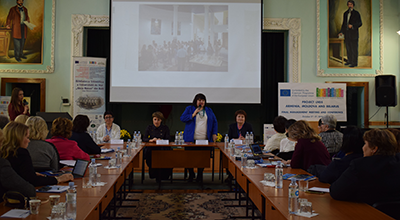
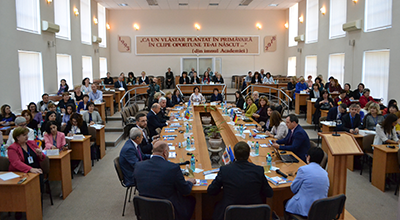
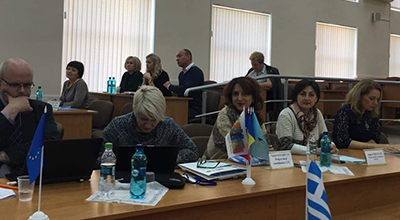
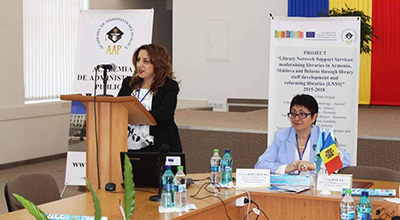
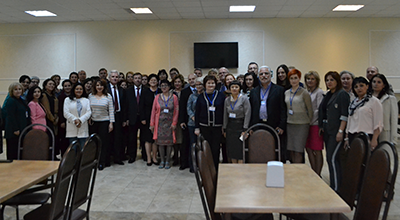
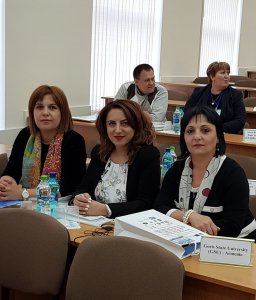
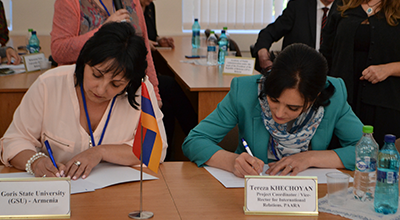
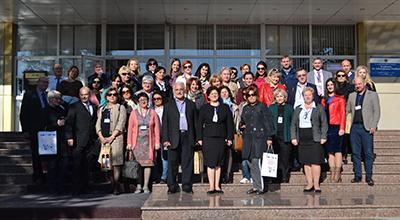

Higher Education interdisciplinary Reform in Tourism management and Applied Geoinformation curricula
PROJECT SUMMARY
The project HERITAG aims to develop an interdisciplinary reform in higher education programmes at master level and continuing education integrating Geo-information Technologies (GIT) applied to cultural heritage documentation, tourism management and entrepreneurship.
The project promotes the synergy of three main groups of stakeholders: Universities, industry and Administration. The curricular reform integrates the development of capacities in 3 main national and regional priorities in Georgia and Armenia: Geo-information technologies, cultural heritage preservation and documentation, and fostering tourism business and entrepreneurship.
Specific goals of the project are:
• To create interdisciplinary master specialities in GIT for cultural heritage and tourism, integrating marketing and entrepreneurship skills oriented to consolidate local industry, following the guidelines of the Bologna process.
• To establish Geoinformation and Tourism Technology centers (GTTC) in partner countries devoted to train professionals in GIT applied to cultural heritage and tourism, documentation of architectural and historical monuments and to disseminate the history, culture and landscapes using modern geovisualization techniques.
• To create three new GIS laboratories in Tourism Economics Departments and to update existing equipment in partner country universities.
• To foster the continuous education in Higher Education institutions of current professionals by creating interdisciplinary training modules.
• To re-train academic staff in GIT, tourism management and entrepreneurship.
• To introduce and improve good practices for quality assurance in partner countries universities.
• To establish organized links between universities, administration and society to train professionals, creating labor market days, introducing GIT in tourism industry, promoting local entrepreneurship and establishing the basis to protect, document and disseminate cultural heritage and history.
EU PARTNERS
Polytechnic University of Valencia- Spain
Alma Mater Studiorum Universita di Bologna – Italy
Aristotle University of Thessaloniki – Greece
Royal Institute of Technology – Sweden
PARTNER
COUNTRIES ARMENIA
Armenian State University of Economics
National University of Architecture and Construction of Armenia
Goris State University
RUMEA Tempting Trips Club Ltd.
Scientific-Educational Reforms Foundation
Union of Incoming Tour Operators Of Armenia
Associate Partners:
Ministry of Economy
National Center For Professional Education Quality Assurance Foundation
Union of Architects of Armenia
GEORGIA
Georgian Technical University
GIS and RS Consulting Center GeoGraphic
Ilia State University
National Agency for Cultural Heritage Preservation of Georgia
Shota Rustaveli State University
Sky Travel Ltd
WORK PACKAGES (WP)
WP-01. Education and society
WP-02. Curricula development
WP-03. Establish 2 Geoinformation and Tourism Technology Centres (GTTC) and 3 GIS labs
WP-04. Applied training of teaching staff of Partner Country universities
WP-05. Development of continuing education modules
WP-06. Quality assurance
WP-07. Quality control and monitoring
WP-08. Project management
WP-09. Dissemination
WP-10. Exploitation
THE ROLE OF GSU IN THE PROJECT
GSU will participate in all planned project activities:
Participate in the creation of Advisory Board in Armenia (WP1),
Support in the design of survey questionnaire, distributing, processing and analysis of results (WP1),
Review and reform of curricula, development of course contents and teaching materials (WP2),
Equipment purchasing and installation, establishment of GIT laboratory at GSU (WP3),
Attending intensive courses and workshops (WP4),
Design of continuing education modules, developing online teaching materials (WP5)
Elaboration of project guidelines, participation in national monitoring system, attending external evaluation, participation in quality assurance of the project (WP6, WP7),
Daily project management, participation in management meetings, videoconferences and preparation of financial and narrative reports (WP8),
Dissemination of materials about project results and activities on GSU official website and social networks, promotion of GIT laboratory, master and continuing education, participation and promotion of labour market days, attending final conference (WP9),
Taking further actions in order to assure the Project sustainability (WP10).
DELIVERABLES
WP 1. Education and society
1.1. Creation of Advisory Board with social stakeholders
1.2. Analysis of needs and opportunities in cultural tourism industry
1.3. Elaborate a cooperation agreement between University, Industry and Administration
WP 2. Curricula development
2.1. Interdisciplinary curricula reform at master level in GIT and Tourism economics
2.2. Develop new course contents at master level
2.3. Develop new teaching materials
WP 3. Establish 2 Geoinformation and Tourism Technology Centers (GTTC) and 3 GIS labs
3.1. Analysis of needs and equipment acquisition
3.2. Installation of equipment, testing and training
WP 4. Applied training of teaching staff of PC universities
4.1. Basic GIS course for economics and tourism
4.2. Intensive course mobile and web mapping for cultural heritage tourism
4.3. Workshop in Entrepreneurship in tourism
4.4. Intensive course in laser scanning and 3D modelling
4.5. Intensive course in Photogrammetry for cultural heritage documentation
4.6. Intensive course in Economics for tourism development
WP 5. Development of continuing education modules
5.1. Design 2 modules for continuing education
5.2. Create online teaching materials for continuing education
WP 6. Quality assurance
6.1. Workshop in Quality Assurance in Higher Education
6.2. Workshop in case method learning and teaching
6.3. Elaboration of a quality assurance plan
WP 7. Quality control and monitoring
7.1. Elaboration of project guidelines
7.2. Monitoring visits to PC
7.3. National monitoring system
7.4. External evaluation
WP 8. Project management
8.1. Project start-up meeting
8.2. Daily project management
8.3. Annual meetings of the project management committee
8.4. One-on-one meetings by videoconference
WP 9. Dissemination
9.1. Project website and social networks
9.2. Promotion of GTTC, master and continuing education
9.3. Labor market days
9.4. Final dissemination conference
WP 10. Exploitation
10.1. Actions to ensure sustainability
Georgia, Tbilisi
Two training courses of ”Basic GIS for Economics and Tourism” in the framework of Erasmus+ HERITAG project were held in Tbilisi on April 23-30 and June 18- 25, 2016. Two participants from GSU, Gurgen Minasyan, Head of the Chair of Economics and Hayk Martirosyan, Lecturer at the Chair of Electronics took part in the trainings. The international project Erasmus +HERITAG (Education interdisciplinary Reform in Tourism management and Applied Geo-Information curricula) has partners from four European countries (Italy, Spain, Sweden, Greece) and several universities and tourism organizations from Georgia and Armenia such as Armenian State University of Economics (ASUE), National University of Architecture and Construction of Armenia (NUACA), Goris State University (GSU), Center for Education Reform Armenia and Union of Incoming Tour Operators of Armenia (UITO). The GIS training courses were held in two stages which were mainly oriented on GIS maps, pinning down geographic data, symbolizing quantitative data, analyzing spatial relationships, making map layout, editing and analyzing GIS data, as well as solving GIS related problems. During the trainings the Georgian experts delivered theoretical lectures and introduced the participants the GIS application process right on the spot, in different districts of Tbilisi. The project aims at the development of tourism business and the introduction of the GIS technology into the education process. Eventually the GSU participants of the GIS trainings will apply the knowledge and experience gained at the trainings at our university particularly in the new Master program “Tourism Management” and at the GIS laboratory at GSU.
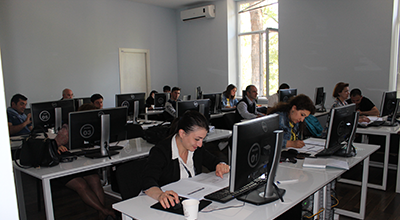
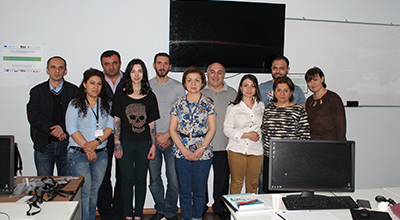
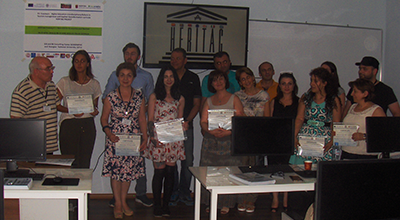
Spain, Valencia
On October 30 to November20, 2016 the training “Tourism Entrepreneurship” within the framework of ERASMUS + HERITAG project was held in Valencia, Spain. Two participants from GSU Hayk Babayan, specialist at the Department of International Cooperation and Quality Assurance and HERITAG project Coordinator and Gurgen Minasyan, Head at the Chair of Economics participated in the trainings. The project aims at the development of tourism business and the introduction of the GIS technology into the education process. The program of the training “Tourism Entrepreneurship” included: • Introduction to the Start Up School of Valencia Polytechnic University • lectures on enterprises and business models, • group workshops of the creation and presentation of business plans. A site visit to the Start Up Center of Valencia Polytechnic University was organized on the last day of the trainings.
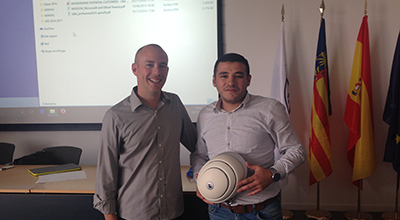
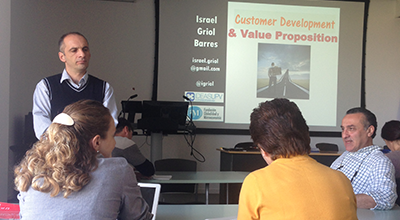
Armenia, Goris
On December 16 in Goris State University were invited HERITAG (Education Interdisciplinary Reforms in Tourism management and Applied Geoinformation ) education program coordinator professor at the Polytechnic University of Valencia Luis Angel Ruiz Fernandez and HERITAG program coordinator in Armenia professor at the National Polytechnic University of Armenia Varazdat Hovhannisyan. The meeting were attended GSU Rector Artush Ghukasyan, HERITAG Coordinator at GSU Hayk Babayan, lecturers, HERITAG program stakeholders, students and other guests. In his welcome speech GSU Rector A. Ghukasyan expressed his willingness to support program implementation. Greatly impressed by his first visit to GSU, Luis Angel Ruiz Fernandez briefly presented HERITAG educational program, the purpose of their visit and answered questions of the attendees. After the presentation was organized project management meeting, during the meeting was presented the main objectives and activities of the program, general management issues also financial and technical issues were discussed.
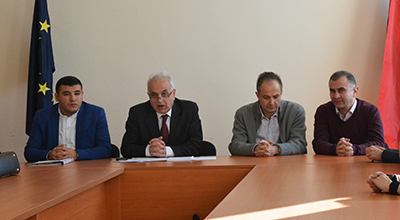
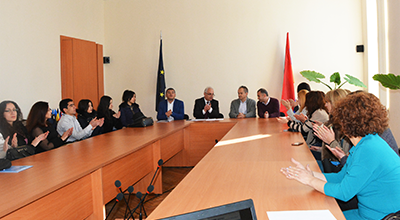
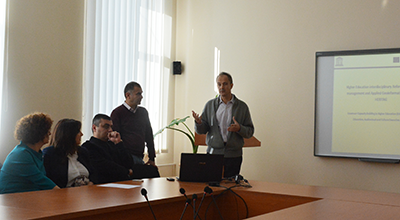
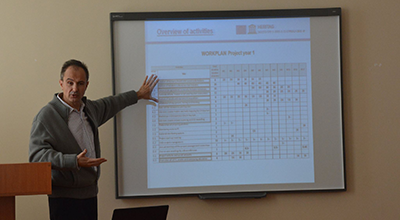
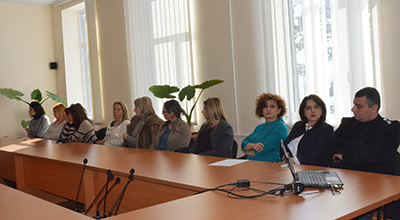
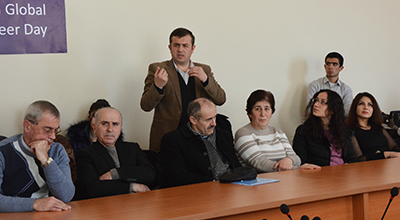
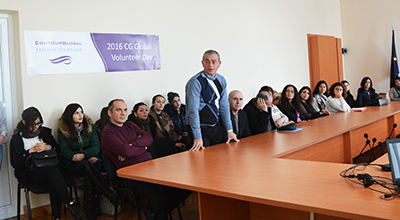
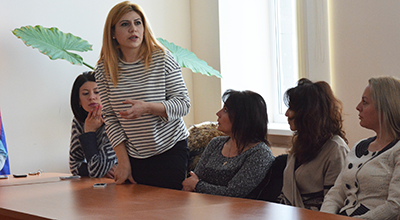
MONITORING OF ERASMUS+ HERITAG PROJECT IN NATIONAL UNIVERSITY OF ARCHITECTURE AND CONSTRUCTION OF ARMENIA
A monitoring meeting of ERASMUS+ HERITAG project was held at the National University of Architecture and Construction of Armenia on February 28, 2017. Head of the National “Erasmus+” Office in Armenia, Ms Lana Karlova and the Armenian coordinators of the partner universities of the project were present at the monitoring event. A. Ghukasyan, rector of GSU, H. Babayan, specialist at the Department of Quality Assurance and international Cooperation and local coordinator of Heritag project, R. Taptughyan, chief accountant at GSU and G. Minasyan, head of the Chair of Economics of GSU participated in the monitoring visit as well. The coordinator of ERASMUS+ HERITAG project in Armenia V. Hovhannisyan welcomed the participants and spoke about the work implemented, mutual visits and future activities in the framework of the project as well as some financial and technical issues relating to the project. Erasmus+Heritag project coordinator at GSU H.Babayan delivered a report about the work implemented and future activities in the framework of the project. The participants of the meeting discussed general and specific activities and summarized the list of upcoming activities
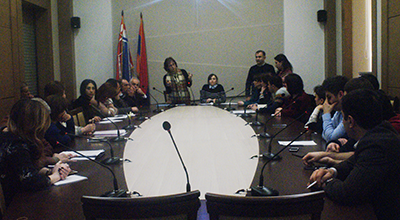
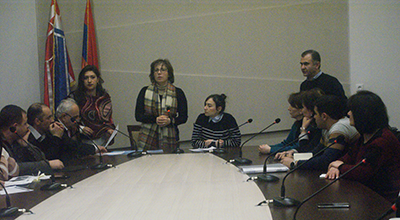
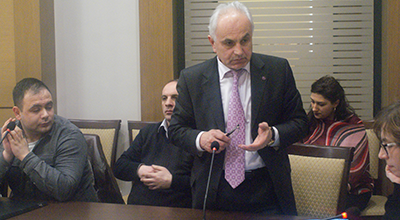
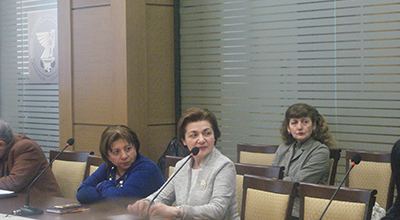
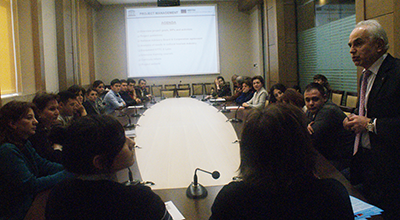
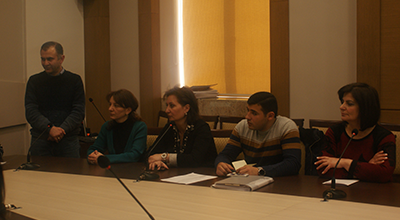
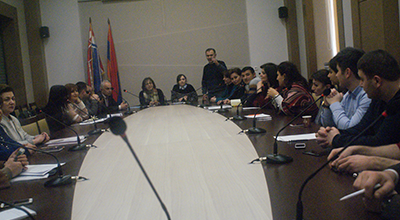
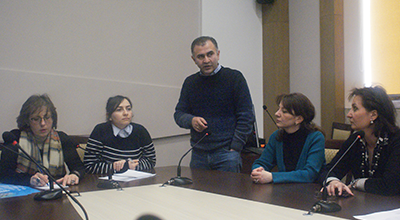
RIMINI, ITALY
The trainings in the framework of Erasmus+HERITAG planned by UNIBO were held in Rimini (near Bologna), Italy, on 20-31 March, 2017. The representatives from the Armenian and Georgian partner institutions were participating in the trainings. H. Babayan, specialist at the Department of Quality Assurance and international Cooperation and local coordinator of Heritag project, R. Taptughyan, chief accountant at GSU and G. Minasyan, head of the Chair of Economics of GSU participated in the trainings. The course of the trainings covered the following topics; Creative industries and tourism Economics of Tourism Cultural Economics Big data in Tourism Culture and tourism for local sustainable development Human resource management and Organization of Tourism Enterprises Web reputation and performance measurement systems in the tourism industry. During the training weeks the participants visited Innovation Square and Start-Up Centre in Rimini.
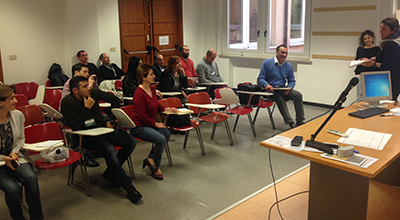
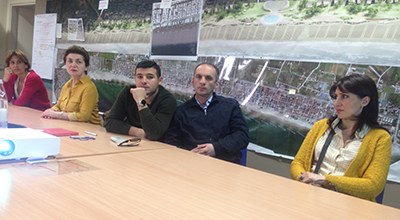
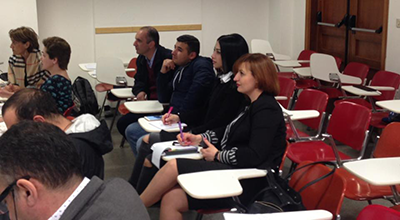
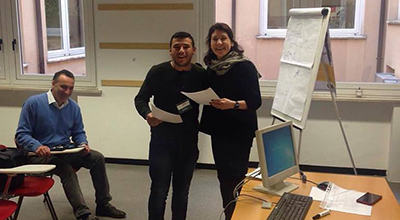
A project partner meeting in the framework of Erasmus+HERITAG project was held in Rimini, Italy, on 23-24 March, 2017. The representatives of the partner member institutions from Armenia, Georgia, Spain, Greece and Italy were present at the meeting. A. Ghukasyan, rector of GSU, N. Safaryan, person in charge of International cooperation and projects and H. Babayan, specialist at the Department of Quality Assurance and international Cooperation and local coordinator of HERITAG project from GSU were participating in the meeting. The curricula designed by the respective universities, the advisory board and its membership, the results of the survey carried out among the stakeholders and students, the upcoming activity plans as well as some financial and technical issues were represented and discussed during the two-day session of the meeting.
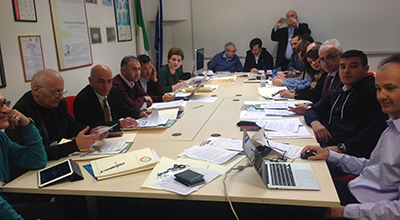
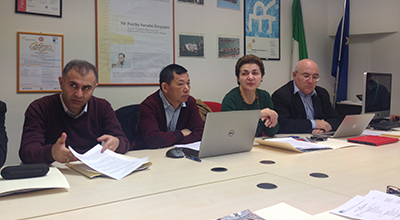
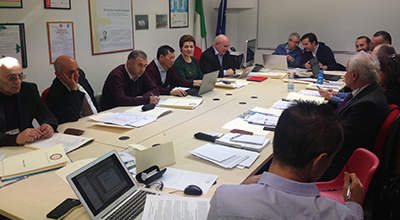
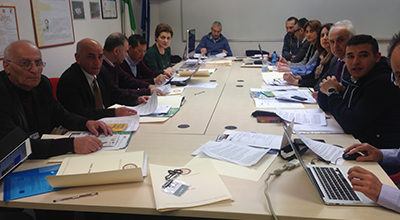
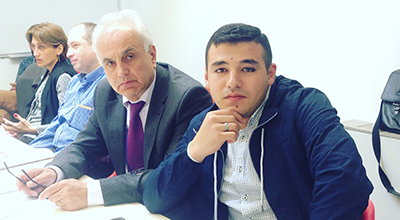
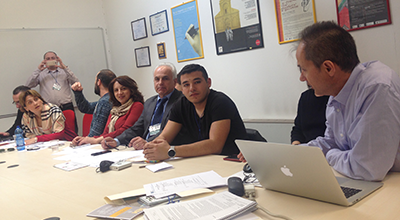
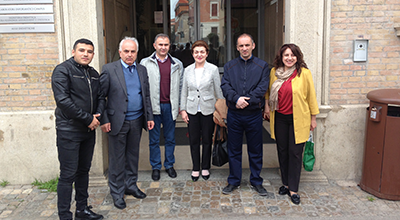
EVENTS DEVOTED TO LIBRARY AWARENESS DAY AT GSU
A range of events devoted to Library National Awareness Day under the slogan “A gateway to knowledge” was held on May 3, 2017, at Goris State University in the frameworks of Erasmus+Library Network Support Services (LNSS): modernizing libraries in Armenia, Moldova and Belarus through library staff development and reforming library services Project. The participants of the event were welcomed by the rector of GSU A. Ghukasyan who emphasized the purpose of the day, the role and importance of the awareness for the best organization of the library work. The coordinator of the project at GSU N. Safaryan delivered a report about the objectives, the implementation of the work packages, the trainings and workshops within the project, its tangible results, the measures undertaken aiming at the modernization of the library as well as the Library National Awareness Day. The chief librarian of the library N. Shalunts made a presentation about the involvement of the GSU library in the project, the mutual meetings, discussions, trainings and the exchange of best practices among the consortium member university libraries and librarians of the project, the newly reconstructed reading hall as well as the preparation work for the digitization process at GSU library. The secretary of the Students’ Scientific Association, a four-year student of the Faculty of Humanities and Social Sciences S. Alaverdyanmade an impressive informative presentation about the most beautiful and unique libraries of the world and her perception of the libraries in general. The first part of the event wassummarized by active discussions, exchange of opinions and useful suggestions by the representatives of GSU academic and administrative stuff, town municipality, community librariesand Media. The second part of the event took place at the GSU library reading hall where the participants students welcomed the guests and made a literary-cultural presentation about ancient libraries and the first printed Armenian books as well as the life and works of the great Armenian poet Hovhannes Shiraz. This was followed by a flash-mob event initiated and organized by the students. The purpose of the flash-mob was to inform the community about the Library Awareness Day.








Workshop on Quality Assurance in Higher Education the fourth project management meeting in Batumi (Georgia)
A workshop on QA in Higher Education (September 26 – 28, 2017) and the fourth project management meeting (September 29) of HERITAG (HIGHER EDUCATION INTERDISCIPLINARY REFORM IN TOURISM MANAGEMENT AND APPLIED GEOINFORMATION CURRICULA) project was hold in Batumi (Georgia), at Shota Rustaveli Batumi State University (BSU). The representatives of the project partner countries were participating in both the events. The QA workshop included the following topics: • Standards and Guidelines for Quality Assurance in the European Higher Education Area • The Internal Quality Assurance system of UNIBO and the players involved • Accreditation label in practice • Curricular development focusing on competences and learning outcomes • QA policy and practice in Armenia: ASUE case, past and perspectives • Organization of Learning Outcome Based Education: Quality Assurance Practice at NUACA • Quality enhancement at ISU Each theoretical training was folowed by practical sessions, discussions and case studies. The fourth project management meeting covered the following issues: • Review of WPs, activities and mid-term report • Advisory Boards and cooperation agreements • Report on Analysis of needs and opportunities • Equipment acquisition and installation. Opening labs SERF will prepare a basic training course for GSU right after installation of computers and software. Opening ceremonies of the labs will be programmed together with other activities, such as labour days or external evaluation visits, so this will increase the dissemination impact. • Curricula reform: Course contents (syllabus) and teaching materials, Continuing education modules • External evaluation & National monitoring system Three external experts will visit the partner institutions in January or February 2018 and elaborate a report to advise all partners in the execution of the remaining activities. • Labour market/career days University partners of both countries/Armenia and Georgia/ should inform about dates and format of labour/career days by November 1st, so lab opening ceremonies and other dissemination activities can be prepared during that day. • Elaboration of QA plan • Workshop on teaching methods This workshop from WP-6 will be hosted by GSU at Goris during the week from 16 to 19 of May, 2018. Each EU partner will bring an expert in new teaching methods and the sessions will be completed with new teaching experiences or cases from PC universities • Dissemination activities • Calendar of activities 2018 • Financial aspects • Conclusions and deadlines
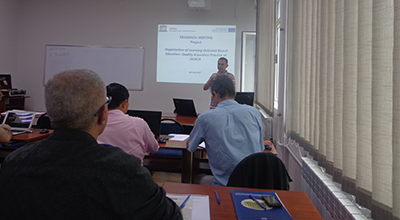
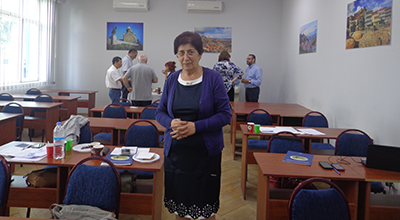

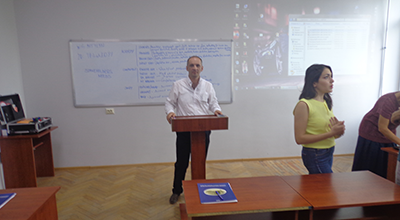
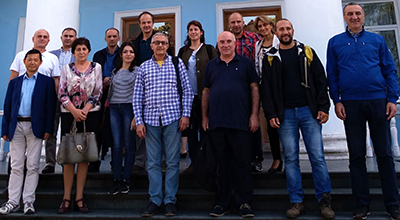
A workshop on “New Teaching Methods” and the opening of GIS laboratory at GSU
A three-day workshopon “New Teaching Methods” (WP 6.2) within the frames of EU funded Erasmus+HERITAG project “Higher Education Interdisciplinary Reform in Tourism management and Applied Geoinformation Curricula” was held on 14-16 of May, 2018, at GorisState University.
The materials presented at training workshop by the experts were concerned with the introduction of some new teaching and learning methodsat university level. Case studies, problem and project based learning(PBTs) and Interactive teaching methods were presented as effective teaching methods in the professional spheres of Tourism Management and GIS. The experts and specialists of the partner institutions referred to the best practices of the introduction and application of the above-mentioned methods. During the discussions they also spoke about the outcomes, plans and problems relating to the application of these methods in their respective universities.
The workshop was designed for the representatives of the academic and administrative staff of GSU and partner institutions. 35 trainees participated in the workshop and were awarded certificates.
At the opening ceremony of the workshop the rector of GSU A. Ghukasyan and the project coordinator Luis Ruiz delivered welcome speeches. The rector of GSU A. Ghukasyan spoke about the importance of the international cooperation, the achievements and future plans connected with it. He briefly spoke about the phases of the implementation andtangible outcomes of “HERITAG” project. He particularly stressed the introduction of the new Master academic program “Tourism Management” at GSU with the methodological support of the specialists from the partner universities and the acquisition of the necessary equipment to ensure the successful implementation of the MAP, introduction of GIS in Tourism and carrying out research in the field.
The trainings were delivered by the expertsof the European,Georgian and Armenian partner HEIs and other institutions of the consortium. The workshop training topics were as follows:
• Huaan Fan “Active learning methods with focus on PBL” (KTH),
• NersesGevorgyan “Project Based Learning/Teaching Method” (ASUE),
• VarazdatHovhannisyan “Interactive teaching method practices”(NUACA)
• IrakliUgulava “NEW CONCEPT OF TEACHING METHODS OF GIS FOR CULTURAL HERITAGE, TOURISM AND BUSINESS DIRECTIONS IN ISU” (ISU)
• Catherine Khokhiashvili ,Irina Kazariani”NEW SYLLABI AND TEACHING METHODS IN ‘GIT FOR CULTURAL HERITAGE AND TOURISM’ INTRODUCED AT GTU ” (GTU)
• Maurizio Mussoni “BEST PRACTICES IN UNIVERSITY TEACHING” (UNIBO),
• EleniPapadopoulou ” Quality Assurance system and e-learning platform at AUTH” (AUTH)
• Oscar Morant Startup Creation and Business Plan Generation (UPV).
GSU representatives made a presentation on the plans and problems relating to the introduction and implementation of the reforms in the new Master academic program “Tourism Management”. The curriculum of the program includes the courses “Application of GIT in Tourism” and “The technology of data collection and data creation”. The partners of the project, who have great experience and professional skills in the field, expressed willingness to support GSU with necessary consultation and teaching materials in order to contribute to the successful implementation of the academic program.
At the end of the first day of the training workshop the launch of the new GIS Laboratory at GSU was another significant event with the participants of the workshop, the representatives from GSU academic and administrative staff, the local municipality, NGOs and Mass Media. The GIS lab was established in the frames of Erasmus+HERITAG and is equipped with the necessary equipment for trainings of students and professionals in GIT applied to cultural heritage and tourism as well as the preservation, documentation and mapping of the architectural and historical monuments, cultural heritage and fostering tourism business and entrepreneurship.
At the opening ceremony the rector of GSU delivered a speech emphasizing the importance of the importance of GSU partnership in HERITAG project and the GIS and GIT applied to spheres of management and economics considering the fact that their application will foster the research and study of the problems available in tourism and economy as well as enable the students and specialists of the sphere to gain new skills and capacities.
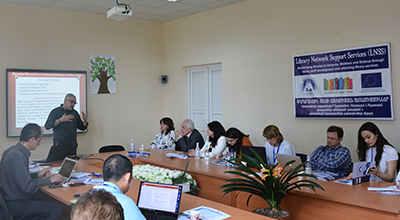
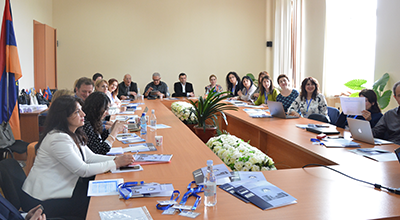
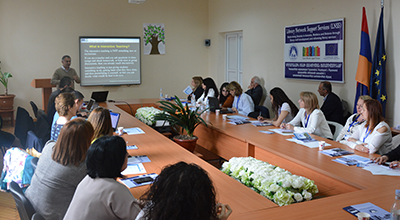
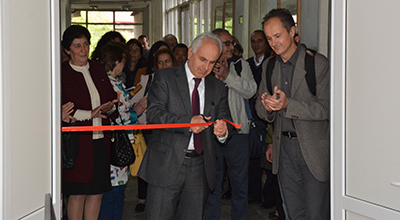
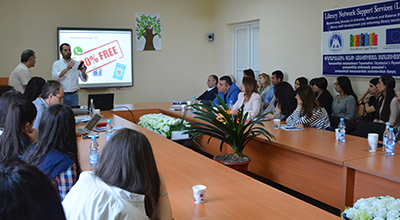
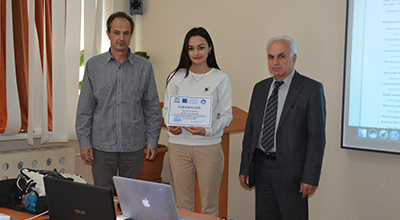
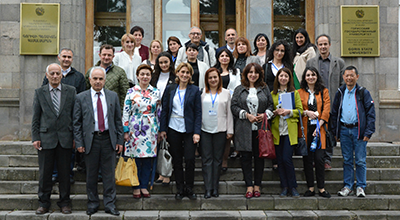
Final conference of Erasmus+ ‘Higher Education interdisciplinary Reform in Tourism management and Applied Geoinformation’ (HERITAG) Project
The Final Conference of Erasmus+’Higher Education interdisciplinary Reform in Tourism management and Applied Geoinformation’ (HERITAG) project was held on 3-6 April 2019, at the project partner Georgian Technical University in Tbilisi, Georgia,. The representatives from all the partner universities and beneficiary organizations of HERITAG, as well as representatives from Georgian and Armenian tourism federations participated in the conference.
Gurgen Minasyan, Associate Professor at the Chair of Economics and Management, person in charge of the Laboratory of Geographic Information System (GIS) as well as member of ERASMUS+ HERITAG project working group participated in the conference and represented Goris State University,.
According to the agenda, HERITAG final conference was held on April 3, during which G. Minasyan made a speech on behalf of Goris State University, speaking about the impact and important outcomes of the project at GSU, the necessity of introducing the Master Academic Program “Tourism Management”, and the creation of the curriculum, modules and the interdisciplinary reforms. G. Minasyan also touched upon the GIS laboratory at GSU, GIS training courses and Labour Market/Career Day and other events implemented in the frames of the project. The HERITAG-CulturWB Inter-coaching Workshop was held on April 4, and the final HERITAG Project Management meeting to discuss and review the deliverables and partner inputs for the final report, took place on April 5.
On the last day of the conference, April 6 a site visit was organized for the participants to Kakheti Region of Georgia.
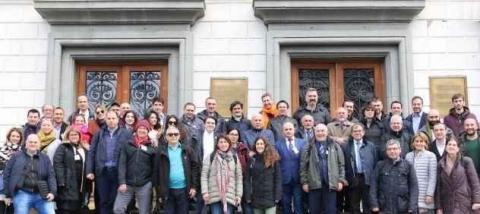
Capacity Building in Sustainability for Architectural Heritage / SAH
Start date of project activity(ies)
1st December, 2020
The Aim of the Project
The project SAH aims to update and improve the quality of curricula in the sphere of Sustainability for Architectural Heritage (Historic BIM and Urban Historic Landscapes) in RF, Armenia and Iran to meet the needs of sustainable development of a global market.
Specific Project Objectives:
Development and testing of new interdisciplinary Model and BSc&MSc programs of architectural engineering practical-oriented education for Sustainability for Architectural Heritage in line with best EU practices to increase awareness and response to environmental changes
Creation of an interaction platform of education, science, production and authorities in order to form modern professional competences of specialists responding needs of sustainable society in sphere of Architectural Engineering & Restoration.
The Role of GSU in the Project
Within the framework of the SAH program, the University will carry out the following activities:
- WP1: Participation in draft list of competencies and learning outcomes for a new type of architect-restorers for Sustainability for AH; survey among the associated members, employers and graduates on the importance and quality of teaching of general and professional competencies and learning outcomes; trip of academic staff to EU universities with benchmarking review of existed standards and knowledge; development of new and updated curricula for BSc and MSc courses.
- WP2: Intensive language training for the retrained academic staff and senior managers; work out new and updated courses, several existing courses renewed and adapted for training process; list of modules with modules specifications; methodical training books/syllabuses prepared and published; glossary of terms in the field of Sustainability for Architectural Heritage in English, Armenian languages; International project teams of students formed to work on real-case tasks from industry.
- WP3: Survey of students’ opinions about the new forms of learning and analysis of results; Electronic publications of the reports; agreement documents on quality assessment; preparation of reports; feedback from students and supervisors presented on WEB-site; development and presentation of a business plan for sustainable functioning of the NSAH center
- WP4: Planning of dissemination project activities: project web site for popularization of new interdisciplinary model ; student ‘info-days’; development of a business plan for sustainable functioning of Centres; preparation of information and promotional materials; business plan and road map for NSAH centre; report on the seminars and discussions of the various business plans, which are to be held at NSAH centre in cooperation with industrial enterprises
- WP5: Management and coordination of all project activities at the University; participation in all trainings; coordination of trainings; coordination o fthe NSAH center establishment and functioning; coordination of new courses and updated courses accreditation and approval: coordination of the interaction with enterprises
Outputs and Outcomes
- WP-1 Preparation: New interdisciplinary Model and BSc&MSc programs of architectural practical-oriented education for Sustainability for Architectural Heritage.
1.1. Review, Tuning / Modernization of existing curricula of two cycles (MSc, BSc) according to Bologna Process requirements. Elaboration the List of generic and professional competencies in sphere of Sustainability for Architectural Heritage
1.2. A set of courses and training materials is elaborated.
- WP-2 Development: Institutionalization of the BSc and MSc programs in RF, Armenian and Iranian universities
2.1. The Network of Multidisciplinary centres “Sustainability for Architectural Heritage” (NSAH) is created
2.2. Students trainings are organized in partner universities. Guest teachers from EU universities presented lectures via the video-conference
2.3. Seminar (P4) for selection of students’ projects. International student teams have been formed and are working with real-case projects
- WP-3 Quality plan: Quality Assurance and monitoring
3.1. Internal monitoring and quality control by IMQCT. 5 x six-monthly reports by (IMQCT)
3.2. Estimation of international students teams’ projects quality
3.3. External audit of the project quality by EQCT. Final report on quality assessment at FIC (P6).
- WP-4 Dissemination and Exploitation of results
4.1. Project web site
4.2. Dissemination info days and Final Conference
4.3. Development and presentation of business plan for sustainable functioning NSAH Centres
- WP-5 Management
5.1. Project Board (PB) yearly meetings
5.2. Regular work of project managers and administrators, Team building.
5.3. Mandatory final accounting audit of the project financial statement
Project partners
- Università degli Studi dell’Aquila (UNIVAQ)
- Building Crafts College (BCC)
- Rheinisch-Westfälische Technische Hochschule | RWTH Aachen University Faculty of Architecture (RWTH)
- National Technical University of Athens (NTUA)
- Moscow State (National Research) University of Civil Engineering (MGSU)
- Kazan State University of Architecture and Engineering (KSUAE)
- Northern (Arctic) Federal University named after M.V.Lomonosov (NArFU)
- Samara State Technical University (SSTU)
- National University of Architecture and Construction of Armenia (NUACA)
- Goris State University (GSU)
- University of Tehran (UT)
- Tabriz Islamic Art University (TIAU)
- Chamber of Architects of the Republic of Armenia (CAA)
New courses in GSU implemented by the Project
- Digital Technology for Heritage.
- Surveys for Heritage.
- Understanding the Historical Urban Landscape.
- Sustainability in Architectural Heritage.
- Sustainable Tourism for Heritage.
- Climate Change and Environmental Impact on Heritage.
- Theory and Methodology of Preservation of Architectural Heritage.
- Open Public Space Architecture in Urban and Natural Landscape
Support for Innovative Methodology, Approaches and Tools for Teaching through the Medium of English in order to improve Educational Yield, Sustainability and Internationalization [SMARTI]
Sign the grant agreement by November 15. The project starts January 15.
PARTNERS:
- P1.TU Dresden – Coordinator
- P2. Riga Technical University (RTU)
- P3. Liverpool John Moores University ( LIMU)
- P4. Universidade Catolica Potuguesa (UCP)
RUSSIA:
- P5. Ogarev Mordovia State University
- P6. Irkutsk National Research Technical University (INRTU)
- P7. Kazan Federal University
- P8. Petrozavodsk State University
- P9. Certification Association “Russian Register” (RR)
ARMENIA:
- P10. Public Administration Academy of the Republic of Armenia
- P11. Vanadzor State University after Hovhannes Tumanyan
- P12. Armenian National Agrarian University
- P13. Shirak University after Mikayel Nalbandyan Foundation
- P14. Goris State University
- P15. National Centre for Professional Education Quality Assurance Foundation
Information relevant for both countries:
From its very clear context SMARTI fits the following National and CROSS priorities set by the partner countries as follows: project category 1: Curriculum development “Multidisiplinary” – “Education” for both Russian and Armenia).
EMI has emerged as a major innovation for simultaneously improving levels of language learning and reforming educational curricula (Eurydice European Commission 2006 & Windows on EMI, CLIL Matrix, ECML 2007). Due to its constructivist methodological principles, it empowers not only teachers, but also learners. Having spread from certain European contexts, it is now influencing QA of academic content in international tertiary paradigms across Europe. The major drivers are not only the learning outcomes achieved, but also the acute need for educational adaptation in a rapidly changing world, and integrated solutions being examined by teachers, researchers and administrators.
According to Internationalization and Modernization documents of ARM partners, the project proposal is in line with the Strategy 2020 of the ARM Government in terms of perfecting the human capital for consolidating them in the process of developing the country. The latter aims at promoting and supporting education and improving the human capital for coping with the poverty through it.
Moreover, the project will foster the state strategy from the perspective of internationalization of education, fostering education in a foreign language and providing high-quality education, as well as producing minds and talents to bring fundamental structural changes into the economy through the modernization of education and science.
Aims and specific objectives:
The project aims at university staff that need to teach degree programs in English. Also for students (both national and international) who attend these programs. These aims are realistic and feasible because institutions realize the benefits AND sustainability of MA and PhD degrees taught in English from an educational AND financial point of view as well as supporting internationalization.
It aims at developing transparent, national and international, educational standards and comparable learning tools and teaching standards in accordance with Bologna criteria; enhancing the quality of academic content and staff and students in the Programme Countries through development of a sustainable curricula for teacher training; provide support the internationalisation of participating EU and PC institutions and support staff and student mobilities and exchanges
In Armenia the project also aims to help the partners to achieve the requirement set by Armenian Government:
– To increase the employability of the students by introduction of EMI Degree programmes.
– Make Armenian tertiary education fully recognizable for EHEA.
– Improve the quality and accessibility of education through updated EMI content and methods to support HEIs and internationalization of Armenian education.
Among Arminian partners there was a strong indication not only to limited pedagogical capacity, but also poor language skills. That is why one of the project activities will cover (applicable for both Russian and Armenia PCs) Standard English levelling test to determine teachers’ English Level (English level Staff Audit). EU universities indicate B2 as a standard level for teaching via English.
A special training inEnglish for Specific Purposes module to support weaker staff with English skills (face to face & self-study) and support stronger staff with specialist terminology and Introduction to ECTS/TUNING module creation training.
We use Language Centre staff because of English language which follows EU experience & best practice in Germany, Latvia and Portugal plus UK by training in EMI methodology (as above) and then train staff rom different academic fields. i.e. Science, Engineering, Economics, Humanities, etc.
EMI degree programmes pays great attention to Internationalization strategy by increasing academic mobility by brining international students through EMI programmes. For staff, it will help to improve their English language competence and teaching skills, following the best EU models and will raise their awareness and understanding of other cultures and countries and help them to build professional networks of international contacts. Being able to develop a course and deliver it in English as a Medium of Instruction can make a positive contribution to internationalization, the knowledge economy, labour markets. It will develop skills needed for successful integration into the international academic community. It will help ARM HEIs to fulfil the goal of integration into the global educational and research community.
ACTIVITIES
The project will commence with the Start-Off Meeting where criteria and procedures for communications between partners, management and decision making structures and the functions of local project coordinators will be agreed. All partners will sign the Consortium agreement. All the partners in their Working Groups will draft detailed working plans:
- Dissemination Strategy will outline dissemination activities. This will comprise dissemination of the project process, the project results and promotion of centers of quality assurance in doctoral education which will be promoted before, during and post project. It will be aimed at all stakeholders and beneficiaries such as universities, research institutes, public administration institutes, job market, accreditation agencies, MA/PhD students and researchers and be a basis for the final 6 month Accredidation Plan.
- Management Plan will outline regular management procedures including financial management.
- QA Strategy with the criteria for internal QA, based on the indicators for progress elaborated by IEWG (IEWG): on the basis of the LFM.
The online platform will be discussed for immediate development which will be a Month 3 project milestone.
Preparation includes generating the information input for the development phase. It starts with desk and field study of PC practices in EMI teacher enhancement approaches via SWOT analysis, surveys, self-assessment and analysis of results. All degree programmes which are delivered in English (where applicable) will be examined at each PC University. Desk and field study will be based on in-depth survey of practices of at least 20 RUS and 15 ARM Universities.
The information input generated at Prep. WP will develop into the training conducted on QA English for Specific Purposes and ECTS/Tuning Modular training (1 week for PCs in UK). After this training the PC universities will conduct PC Home Multiplier Training for Dissemination and sustainability of its results among project team members and other stakeholders.
The inventory of the best European EMI teaching methodologies, development of EMI teaching descriptors, and the results of the survey will allow EU partners to develop pivotal content and materials for the Main EMI Curriculm Training hosted by RTU, Riga, Latvia. After it PC partners will create a 9 Module EMI curriculum training:
Module 1: Communicative Approach (student-centered) and Blended/ICT/E-Learning strategies that are as opposed to the more common traditional teaching approaches used in all faculties.
Module 2: EMI Oral Teaching Skills Part 1 (including range for lectures, seminars, lab sessions)
Module 3: EMI Oral Teaching Skills Part 2 (Case Studies to support analytical thinking approach as specifically recommended by Armenian and Russian Lead partners)
Module 4: EMI Research & Writing Skills (relating to research, thesis writing, supervision, for MA/PhD Cycle. This also involves Information Literacy input.
Module 5: Pre-Module Curriculum Development ECTS and EU Tuning Framework Training
Module 6: EMI Module Curriculum Development and Instructional Design
Module 7: EMI Student Assessment strategies (formal and alternative assessment).
Module 8: EMI QA Module Benchmarking and Validation in EMI environment. This includes a model of digital transformation of EMI implementation in academic sector, with focus on effectiveness assurance based on data analytics.
Module 9: ESP Pathway Program Module. This EMI English for Specific Purposes Training (terminology, soft skills, and key writing skills) package for PCs is based on an English Language Staff Audit.
To raise the QA level of the piloted material, guest staff from EU universities will deliver lectures and seminars during their Piloting trips to PC partners. Evaluations of the pilotings will be conducted by EU partners. The evaluation report of 1st piloting and improvement plan will be presented during Interim Project conference at PAARA, Yerevan, Armenia. It will be followed by the Second Piloting. All the reports will be uploaded to the Online platform.
After both pilotings, one best trainer teacher and a trainee teacher/ student will be selected at each PC university to take part in study visit to observe and participate in MA programs taught with EMI at UCP, Porto. After study visit trainee teacher students and staff will disseminate the project learning methodology on faculty and institutional level and prepare EMI courses in English.
Development and set-up of EMI Centres in PC HEIs is a significant milestones, as all further EMI activities related to PC, will be done within EMI Centers, using their infrastructure and staff. The networking agreement for EMI Centres will be signed and uploaded to the online platform for dissemination and sustainability purposes.
The publication of an EMI Handbook with teaching methodologies will be prepared jointly by staff from the EU, RF and ARM. A concise glossary of terms in the field of EMI teaching in English, Russian and Armenian will be prepared. It will enhance the quality of these training materials.
The outcomes of the project will be presented at the Final Conf. at KFU, Russia. Inter University Networking agreement of EMI Centres will be signed.
Important activities for Dissemination/Sustainability will be the three National Awareness Days and arranging project Conference “Changes and best practices in EMI across Europe, Russia and Armenia” together with Final Project Conference.
The main aims of the project monitoring and quality control are:
– to assess the coherence of the planned activities with the designed activities;
– to monitor the activities carried out with the planned activities and the on-time assessment of the planned project results;
– to assess the quality of the project results.
For QA control and monitoring of project activities 2 teams will be created:
- Internal Evaluation Working Group (IEWG). It will consist of 2 experts selected from the two Armenian and Russian QA agencies, who will not be involved in any other activity of the project. The representatives of the Coordinator will not be involved into IEWG.
- External Quality Control Team: A QA Audit will be done in year 3 by the External Quality Control Team, who are not the partners of SMARTI. It will review the performance of the project, and all deliverables in the course of the project. External experts are not the consortium members and their work will be subcontracted. Their reputation and their credentials in QA of academic programmes will be guaranteed by QA agencies, who lead this WP. The audit report on External QA Audit will be approved by the consortium and uploaded to the online platform.
The Partner Country institutions need the equipment for setting up EMI Centers, make it fully equipped teaching area, which is ready to provide full-fledged classes in EMI for the declared Degree programmes and retraining programmes for academic staff. Some PC HEIS are more equipped with computers. That is why they do not need desk computers. To unable the staff of EMI Centers to face the needs to their target audience, who are located in different buildings, to to travel to the conference to disseminate the project and EMI methodology, EMI Centers need lap tops.
Partner institution [GSU] needs and support required
One of the priorities of the university strategic plan is the internationalization part of which is the introduction of EMI courses and fostering the mobility projects. Surveys conducted among students show that, with appropriate quality and quantity of study programs, students would prefer the study some courses in English. As to the teaching staff, they see the benefits of delivering some courses in English as an advantage and opportunity for their professional development and participation in mobility projects. This circumstance prompted the inclusion of the GSU in the project..
GSU will participate in the Start-Off Meeting (WP5 Management), all project conference; participate in all planning for Preparation stage, dissemination and in QA procedures.
GSU will participate in WP 1 and collaborate on the development of a comprehensive model of training of the competences of the university staff who delivers study programs through English, participate in consultations during development of teacher competence descriptors, and will be involved into tuning of the monitoring methodology for PC universities.
GSU will participate in WP 2 – in training of QA English for Specific Purposes Training and ECTS/Tuning Modular training (1 week for PCs in UK). It will conduct PC Home Multiplier Training inputs of ESP and ECTS/Tuning Modular training, select PC EMI participants for EMI curriculum training and participate in and Main EMI Curriculum Training by EU of EMI participants (in Riga, RTU). It will develop 9 EMI Modules for PC EMI programmes and host the final discussion. It will set-up EMI Centres in PC HEIs and conduct 1st and 2d Pilotings. It will participate in the development of the EMI Pedagogical Handbook and publish it. It will also select EMI staff and students for EMI Study visit and participate in it.
GSU will contribute to WP3 Quality Plan. It will participate in QA seminar within External QA Audit which will be done in year 3.
GSU will contribute WP4. It will populate EMI Online Platform during the lifetime of the project, participation in dissemination seminars and conferences, EMI National Awareness Day Conferences and development of the Sustainability and Accreditation Plan. For WP5 GSU will be involved in regular work management procedures, development of Sustainability and Accreditation Plan, will be involved in all international project meetings, and in the key interim and final conference meetings.
IMPORTANT NOTE: The SMARTI project develops 9 EMI Modules that will support our existing Undergraduate degree programmes «Pharmaceutical Chemistry» and «Management/according to the field/»
Each Module will be 2 ECTS
EMI training curriculum will be intergated into Master programmes «Chemistry» and «Tourism management» with over 8 students first year and around 8 students second year.
TANGIBLE RESULTS
Relevant or both countries
- Three ongoing training programmes are developed and taught for future PC use.
- English for Specific Purposes Training (vocabulary, language and soft skills) and ECTS/Tuning Modular training for PCs with English Language Audit Tests to determine language levels (the ESP training brings participants up to required CEFR B2 level which is an EMI teaching standard)
- EMI training with aim to study pedagogical experience of EU universities, latest EMI practices, new methods of practice-oriented training, EMI assessment, and new approaches to benchmarking and validation in the EMI environment.
- PCs develop from EMI training by EU colleagues a 9 module EMI Staff Curriculum. These modules are developed, piloted, published online, teaching materials printed, and EU reports on piloting are available in printed versions and on-line. The 9 modules are accredited into PC Curriculum.
- Network of EMI Training Centres set-up and running, documents on establishment of Centers are developed and implemented, staff trained and installed, equipment is installed and tested. The Centers provide training courses, methodological research and consultations in EMI teaching/learning in Russia and Armenia. The documents related to the establishement, staff members training, purchased equipment is approved by consortium. EMI Training Centers and their 9 module curricula have strong sustainability due to ongoing demand in Armenia and Russia for EMI training.
- Promotion of PC excellence in education provided by the implementation of a comprehensive QA English for Specific Purposes Training (vocabulary, language and soft skills) and ECTS/Tuning training and Modular EMI training for in-service PC teaching staff and trainee teachers. 9 modules in total. Tangibility is provided by the curriculum piloted twice before being accredited. Accreditation procedure, report on monitoring of RF and ARM practices in teacher training, reports on monitoring of tools, methodologies, approaches implemented in HE for the academic content delivered in English in RF and ARM.
- EMI teaching standards in accordance with Bologna criteria professional competences descriptors are elaborated and published online
- An easy to use EMI Pedagogical Handbook based on 9 modules above is developed and published. PDF variant is unloaded onto the Online Platform and published be PC Universities (100 items per PC HEIs)
- Report on PC practices in EMI teacher enhancement approaches based on evaluation of Russian and Armenian practices in EMI methodologies and student-centred methodologies. Report is approved by consortium and uploaded to the online platform
- Report on EU best practice in EMI practices and EMI teacher enhancement approaches. Report is approved by consortium and uploaded to the online platform
- Reports on Study visit of international staff+students teams are approved by consortium and uploaded to the online platform
- The Final international conference proceedings are published and distributed
- 5 Internal Evaluation Working Group (IEWG) reports are approved by consortium and uploaded to the online platform
- Regular work management reports are approved by consortium and uploaded to the online platform
- The audit report on External QA Audit is approved by consortium and uploaded to the online platform
- The number of people participating in the EMI National Awareness Day Conference and Final International Conference. People registration lists
Erasmus+ SMARTI CBHE Project has Kicked Off
Erasmus+ CBHE “Support for Innovative Methodology, Approaches and Tools for Teaching through the Medium of English in order to improve Educational Field, Sustainability and Internationalization” Project (“SMARTI”) was launched on 31 March -1 April 2021.
The event was organized with the participation of the representatives from the European project partner Universities: Technical University Dresden (coordinator, Germany), Riga Technical University (Latvia), Catholic University of Portugal (Portugal) and Liverpool John Moores University (UK); from Armenian project partner organizations: Public Administration Academy of RA, Vanadzor State University, Armenian National Agrarian University, Shirak State University, Goris State University, National Center for Professional Education Quality Assurance Foundation; and from Russian project partner organizations: Ogarev Mordovia State University, Irkutsk National Research Technical University, Federal State Autonomous Educational Institution of Higher Professional Education, Petrozavodsk University, Certification Association Russian Register.
Under the coordination of Gerard Cullen from Technical University Dresden, the representatives of 15 organizations came together to get acquainted with all members of the consortium and discuss the opportunities offered by the project and the expectations of the participating universities.
During the opening ceremony, the participants were greeted by Carlo Imaricio, Project Manager from the European Education and Culture Executive Agency (EACEA), the coordinators of the Erasmus + National Office in Armenia Lana Karlova and that of Russia Olga Oleynikova. In her speech Lana Karlova emphasized the importance of being very precise, goal-oriented in the implementation of the project and added that following all the tasks and objectives will make it easy to solve all the problems and to have a successful project.
During the three-day event the goals, objectives, expected outcomes were defined, the teams responsible for each WP were represented, the upcoming activities within the project were discussed, the timelines of the activities adjusted and the requirements for the presentation of financial and technical reports clarified.
The Department of External Relations and Cooperation of GSU
AN ACADEMIC BOARD MEETING SESSION AND AWARENESS DAY DEDICATED TO ERASMUS + SMARTI PROJECT
On July 1 Naira Safaryan, the Head of the Department of External Relations and Cooperation of GSU, presented the newly launched Erasmus + “Support for Innovative Methodology, Approaches and Tools for Teaching through the Medium of English in order to improve Educational Yield, Sustainability and Internationalization” (SMARTI) project to the members of the Academic Board of the University.
The meeting aimed to introduce the goals and objectives of the project, the work packages, the role of the University in the project to the internal stakeholders, thus aiming to not only raise their awareness of the project but also foster their active involvement in the activities in the framework of the project.
Hybrid Combined Annual Steering Group Meeting and Training of the SMARTI project at GSU
On October 6-8, Goris State University hosted a hybrid workshop on “Hybrid Combined Annual Steering Group Meeting and Training” under the Erasmus + Capacity Building project “Support for Innovative Methodology, Approaches and Tools for Teaching through the Medium of English in order to improve Educational Yield, Sustainability and Internationalization” (SMARTI). The event was attended in a face-to-face mode by project representatives from the Dresden University of Technology, Liverpool John Moores University, Riga Technical University, Ogarev Mordovia State University, Petrozavodsk State University, Certification Association Russian Register, Public Administration Academy of the Republic of Armenia, Vanadzor State University after H. Toumanyan, Armenian National Agrarian University, Nalbandyan State University of Shirak, Goris State University (Armenia), National Centre for Professional Education Quality Assurance, and other program members from Catholic University of Portugal, Irkutsk National Research Technical University and Kazan Federal University were present in a distant way.
The workshop was opened by the Rector of GSU, Artush Ghukasyan, who welcomed the present and online participants of the project on behalf of the teaching and administrative staff and students of the university. He noted that the content of the project and the planned activities are very impressive and extensive, it implies the prioritization of the main problems of University education, its improvement, efficiency, sustainability and internationalization through the introduction of the innovative methodology of EMI. According to him, the above-mentioned are all priorities for any university and its strategic development. Touching upon the partner universities and organizations within the framework of the project, and emphasizing the importance of the involvement of European and Russian universities in these and other similar projects A. Ghukasyan mentioned that good experience and the way they have gone will have a very instructive impact on the Armenian HEIs and research institutions, in terms of the improvement of the quality of education and success in the field of internationalization. He also spoke about the activities of the NEO-Armenia, within the framework of which many Armenian universities are regularly involved in international projects, gaining experience, new partners, exchanging good practices, improving the educational and communication environment, enriching their material-technical resources, promoting the students, researchers and staff mobility.
Rector of the Public Administration Academy of the Republic of Armenia, Khachatur Ghazeyan made a welcoming speech as well. He thanked the leadership of GSU, represented by the Rector A. Ghukasyan, for hospitality and organizing the workshop in such epidemic conditions. Kh. Ghazeyan noted that this workshop is another opportunity to establish new, efficient cooperation and capacity development.
Tereza Khechoyan, the project coordinator in Armenia and the vice-rector of the Public Administration Academy of the Republic of Armenia, and Natalyia Burenina, the program coordinator in Russia, gave a brief welcoming introduction introducing work packages and the main task for completing. Gerhard Cullen, the project coordinator, presented the activities of the three-day meeting.
On the first day of the workshop, the participants spoke about the conducted monitoring in Russia (June 2021) and upcoming monitoring in Armenia (October 15, 2021) carried out by National Erasmus+ Offices, as well as field and desk studies hold within the framework of the project.
Then, each project partner institution focuses on feedback on EMI materials and the organization of the educational process through the credit system in their HEIs. A methodological seminar followed. The day ended with a traditional Armenian reception.
The second day of the workshop was dedicated to the discussion of several problems related to the operation of the EMI centers, the purchase of equipment and financial issues, as well as the selection of candidates to participate in the training in Riga by determining the level of English proficiency through an online test.
On the third day, the participants discussed the conducted and planned activities devoted to the dissemination of the project. This was followed by a training course for publicity officers. At the end Valeriya Racheeva, the website provider, presented all the sections of the project website, emphasizing the importance of the activities aimed at their content enrichment.
It should be noted that within the framework of the three-day workshop, the participants made historical visits to the Tatev Monastery complex and the best places in Goris.
ESP & ECTS/TUNING MODULAR TRAINING AT UCP
On 16-22 January 2022 in the frameworks of the Erasmus+ SMARTI (Support for Innovative Methodology, Approaches and Tools for Teaching through the Medium of English in order to improve Educational Yield, Sustainability and Internationalization) Project a training “English for Specific Purposes” was held at the Catholic University of Porto, Portugal. GSU was presented by Naira Safaryan, Head of the Department of ERC, local project coordinator, Lilit Atabekyan, Lecturer of the Chair of Biology and Chemistry, Program Officer, Naira Mezhlumyan, Lecturer of the Chair of Foreign Languages, Program Officer, as well as representatives of partner universities, organizations from Europe, the Russian Federation and Armenia.
The training was conducted in face-to-face and distance (hybrid) modes, based on the importance of training and the aim of ensuring greater participation. It has been implemented by EU trainers Gerard Cullen, Sven Riddell (Dresden University of Technology), Eduardo Cardoso, Tim Hogg (Porto Catholic University), Professors Maureen Royce, Ryan Wynn-Williams, Casey Beaumont (Liverpool John Moores University), Ieva Ziemele, Marina Platonova, Tatiana Smirnova (Riga Technical University).
The training courses included theoretical and practical stages. The working language was English.
The first day of the training started with the welcome speech given by Eduardo Cardoso, the representative of the host university. He presented the educational programs implemented at their university and general information about the university.
The results of the WP1 were summarized by Sven Riddell, a representative of the Technical University of Dresden, who also provided participants with general knowledge about the skills and tools for a successful presentation.
Each day of the training, practical tasks were assigned to the participants. For the first day task, each partner university had to prepare a two-slide presentation about the vision of National Awareness Day 2022.
The first part of the second day of the training was dedicated to the topics related to literacy. Trainer Sven Riddell introduced the participants to the skills of writing and presenting motivation letters, reports and minutes. In the second part of the day, Maria Platonova, a lecturer at the Technical University of Riga, made a presentation on student-centered teaching methodology, as well as several educational programs implemented at their university using the methodology “English as a Means of Teaching”. Then Tatiana Smirnova, a lecturer at the same university, spoke about the importance of the European Credit Transfer System (ECTS), emphasizing that it is the guarantee of expanding the student’s academic mobility and recognition of qualifications in the European Higher Education Area. The presentation was followed by interactive discussions on credit education systems in different countries, the use of Bloom’s taxonomy, MOOC (Massive Open Online Courses) and assessment systems.
On the third day of the training, RTU lecturers provided comprehensive information on their university’s international department, career and research centers, English-taught courses and curricula. This was followed by interactive discussions, drawing parallels between the relevant departments of universities in different countries.
The trainers on the fourth day of the course were Maureen Royce, Ryan Wynn-Williams, Casey Beaumont. They touched upon the issues related to the academic progress, continuous training of the teaching staff, the structure and content of the curriculum, the design of an effective curriculum and their solution. Using the example of the module “Academic English”, Dr. Ryan Wynn-Williams presented the key issues and factors of the development of the curriculum, the definition of educational outcomes, and the transition to student-centered learning. The participants were assigned to write four educational outcomes for the above module using the Padlet online platform.
On the fifth day, the trainers summarized the results of the training, presented their remarks and made an evaluation. Taking into account the need to introduce the best practices of partner universities, similar training courses will be conducted in each of the Armenian and Russian partner universities in the coming months, using the materials and presentations provided by the trainers.
In-house Multiplication Training on ESP and ECTS at Goris State University (29 March – 14 April)
The in-house multiplication training on ESP and ECTSwithin the frame of Erasmus+SMARTI (Support for Innovative Methodology, Approaches and Tools for Teaching through the Medium of English in order to improve Educational Yield, Sustainability and Internationalization) Project was launched on 29 March. The participants of the training were welcomed by Tehmina Marutyan, Acting Rector of GSU, Naira Safaryan,Head of the Department of External Relations and Cooperation and local project coordinator, who emphasized the importance of such training courses in the field of higher education as they are aimed at raising the level of educators’ and students’ academic English proficiency, foster the applications of ECTS guideline and European quality assurance standards, as well as the promotion of student-centered learning.
The training was carried out from March 29 to April 14 and conducted by GSU trainers Naira Safaryan,(Head of the Department of External Relations andCooperation andAssistant Professor at the Chair of Foreign Languages),Naira Mezhlumyan (Assistant Professor at the Chair of Foreign Languages) and Lilit Atabekyan (Associate Professor of the Chair of Biology and Chemistry) and Sona Alaverdyan(Specialist at the Department of External Relations and Cooperation). This was an in-house multiplication event following the training at Catholic University of Portoin January 2022. 20 members of GSUacademic and administrative staff as well as students attended the training.
The training sessions covered a wide range of topics such as:‘How to give effective presentations’, ‘How to write a cover/motivation letter’, ‘Writing a statistical report(graphs, pie charts, bar charts) and useful language for charts, graphs, tables’, ‘Introduction and application of ECTS/TUNING framework’, ‘ECTS and the European Higher Education Area (EHEA). Systematic use of ESG and ECTS Guide, CEFR Guide’, ‘ECTS and lifelong learning, ECTS for programme design, delivery and monitoring’, ‘The programme learning outcomes, learning, teachinginnovative methodology and assessment’, ‘ ECTS and quality assurance’ and ‘Creating an Efficient and Successful Student-Centered EMI Study Programme’.
Each theoretical training session was followed by a practical one based on the assignments designated to the application of the knowledge and their presentation. This was followed by discussions and useful remarks and feedback by the trainers. It should be noted that the working language was English, which was not only challenging, but also intriguing for the trainees. (Level A1 in English was announced to be one of the pre-requisites required for the participation in the training.
On the final day of the training, the participants, who had successfully completed the course, were granted certificates. Tehmina Marutyan (Acting Rector of GSU) and the trainers congratulated the trainees for the successful completion of the training and expressed hope that the gained knowledge and experience will be best applied in the trainees professional career in general and the educational process in particular.
Competences for International Innovation Projects (CompIIT)
Aim of the Project
The goal of the project “Competences for International Innovation Projects – CompIIT” is to prepare Armenian students for this international, digitalized and projectized working environment by developing their project competence, their international communication competence and their entrepreneurial mindset.
Partners
- European University of Armenia (coordinator)
- Fachhochschule Dortmund
- Catholic University of Leuven
- Goris State University
- Yerevan Research Institute of Communications
Work Packages
WP1 ―Management
1.1: Develop CompIIT methods handbook
1.2: Setup Scrumban Core Process (IT tool + workflows)
1.3: Regional coordination
1.4: Implementation of Management Plan
WP2 ―Preparation & Specification
2.1: Set up of collaboration & eLearning platform & web page
2.2: Prepare & Launch the OpenCoPs (Open Communities of Practice)
2.3: Specification of Didactic Concepts
2.4: Specification of Virtual Project Campus and ProCom Language & Communication School
WP3 ―Implementation of Virtual Project Campus
3.1: IT setup of Virtual Project Campus
3.2: Develop eLearning Module ―Project Management Tool Box
3.3: Develop eLearning Module ―Scrum & Kanban
3.4: Develop eLearning Module ―Agile Management in Virtual Project Environments
3.5: Develop virtual cross-border innovation projects
3.6: Deliver ―Summer School on International Project Management
WP4 ―ProCom Language & Communication School
4.1: Modular training package ―Communication for International Project Management
4.2: Elective Package Update
4.3: Train-the-Trainer (for HEIs)
4.4: Professional Education Package (LLL)
WP5 ―Quality Plan: Evaluation and Improvement
5.1: Pilot Teaching and Evaluation
5.2: Data Analytics of Evaluations
5.3: Improvement Management
5.4: Internal Evaluation Board (IEB)
5.5: Develop CompIIT QM manual
WP6 ―Dissemination & Exploitation‖
6.1: Web Portal for ―Cross-border projects in higher education‖
6.2: Digital Marketing and Communication Plan
6.3: Conference Session on Project- based education
6.4 Dissemination Plan
6.5 Sustainabilty Action Plan
THE INTERNATIONAL WORKSHOP OF THE T-GREEN PROJECT WAS HELD AT THE INTERNATIONAL HELLENIC UNIVERSITY IN GREECE.
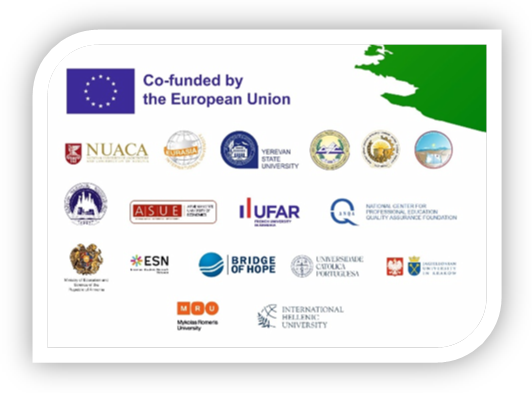
The International Hellenic University in Greece hosted the International Workshop of the Erasmus+ T-GREEN project titled “Transforming Graduate Education for Green and Sustainable Future” on 10-14 July of 2023. The project is funded by the European Union.
Varazdat Hovhannisyan, Head of the Education Quality Assurance and Development Center at the National University of Architecture and Construction of Armenia and coordinator of the project, welcomed the participants during the opening ceremony. He presented the agenda of the international workshop and expressed gratitude to the host university for their efforts, willingness, and important role in the project.
Prof. Panagiotis Tzionas, the Vice-Rector for Academic Affairs of the International Hellenic University, also extended a warm welcome to the attendees. He emphasized the project’s relevance and the significance of the adopted ideas by the participating institutions for the academic community. Tatevik Gharibyan, Head of the strategic planning department of the Ministry of Education, Culture, Sports, and Science of the Republic of Armenia, highlighted the importance of cooperation between state educational institutions and European institutions within the project framework and its goals in her welcoming speech.
Arevik Ohanyan, Head of strategic projects at Eurasia International University and T-GREEN project co-coordinator, as well as an Erasmus+ Higher Education Reform Expert (HEREs) expert, presented the project’s chain of reforms and actions, vision, expected results, three-year action plan, and the joint master’s programs provided by T-GREEN.
During the conference, representatives from participating organizations had the opportunity to listen to numerous speeches about European partners’ educational programs, ongoing reforms, existing legal regulations, and quality control measures. They also shared their own experiences and, through group discussions, identified the problems and tasks that project participants should address jointly with universities and other institutions over the next three years.
The three-year project focuses on necessary reforms in post-baccalaureate education at universities, with a key emphasis on “Green” policies. Its implementation aims to facilitate the transition of universities from traditional educational programs to future-oriented, green, and interdisciplinary programs. It promotes student mobility and develops structures for the implementation of educational programs that grant joint qualifications.
The main objective of the project is to enhance the capacities of national and institutional administrative staff, decision-makers, policymakers, educators, researchers, and students. This will enable these stakeholders to integrate sustainable development goals and environmental issues into policies and educational content.
The Armenian participants in the project include the Ministry of Education, Science, Culture and Sports of the Republic of Armenia, the National Center for Quality Assurance, the National University of Architecture and Construction of Armenia (coordinator), Eurasia International University (co-author), Yerevan State University, the State University of Economics of Armenia, the French University of Armenia, National Polytechnic University, National Agrarian University of Armenia, Goris State University, Gavar State University, “Erasmus Student Network Yerevan,” and “Hope Bridge” NGOs.
The EU partners involved in the project are the International Hellenic University (Greece), Mikolas Romeris University (Lithuania), Catholic University of Portugal (Portugal), and Jagiellonian University of Krakow (Poland).
